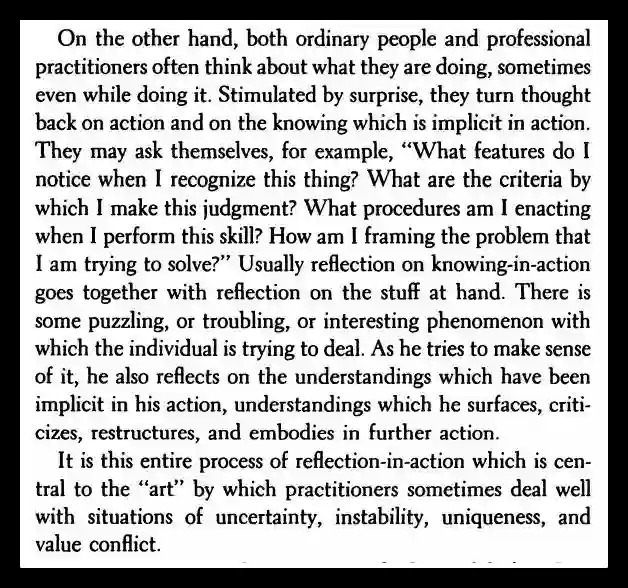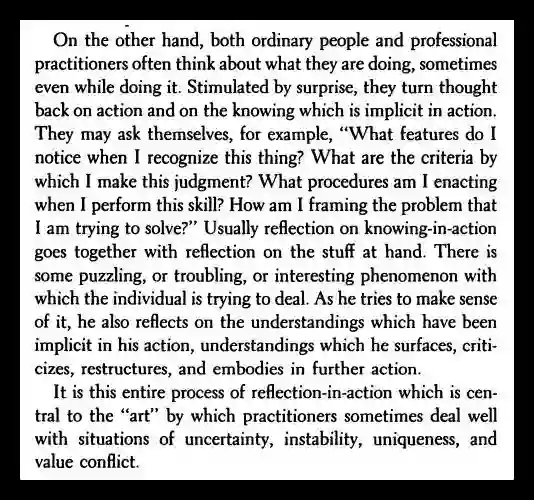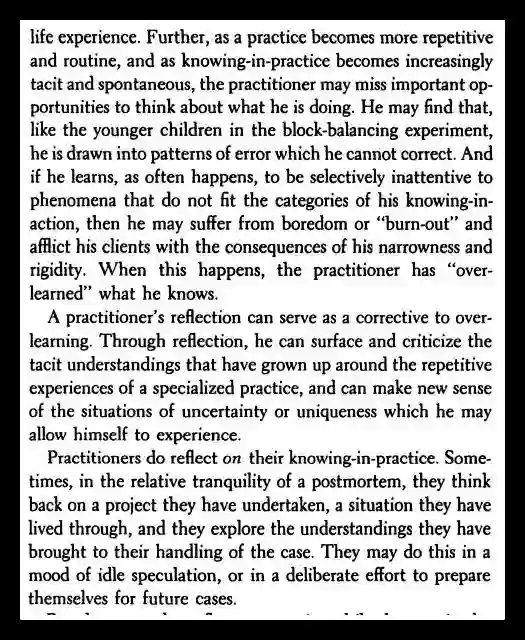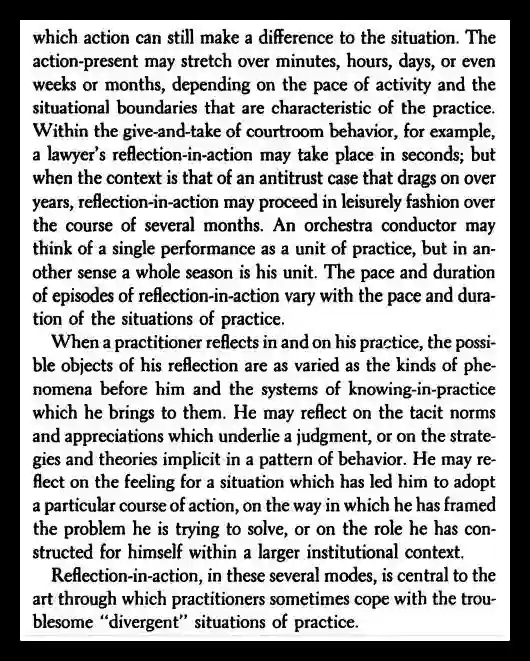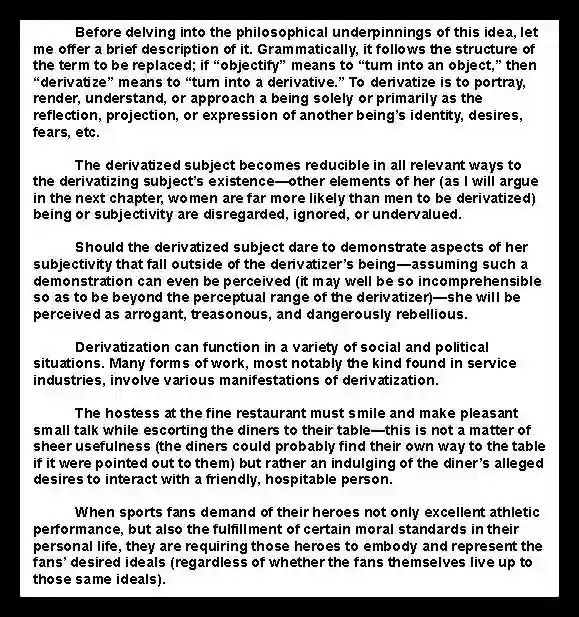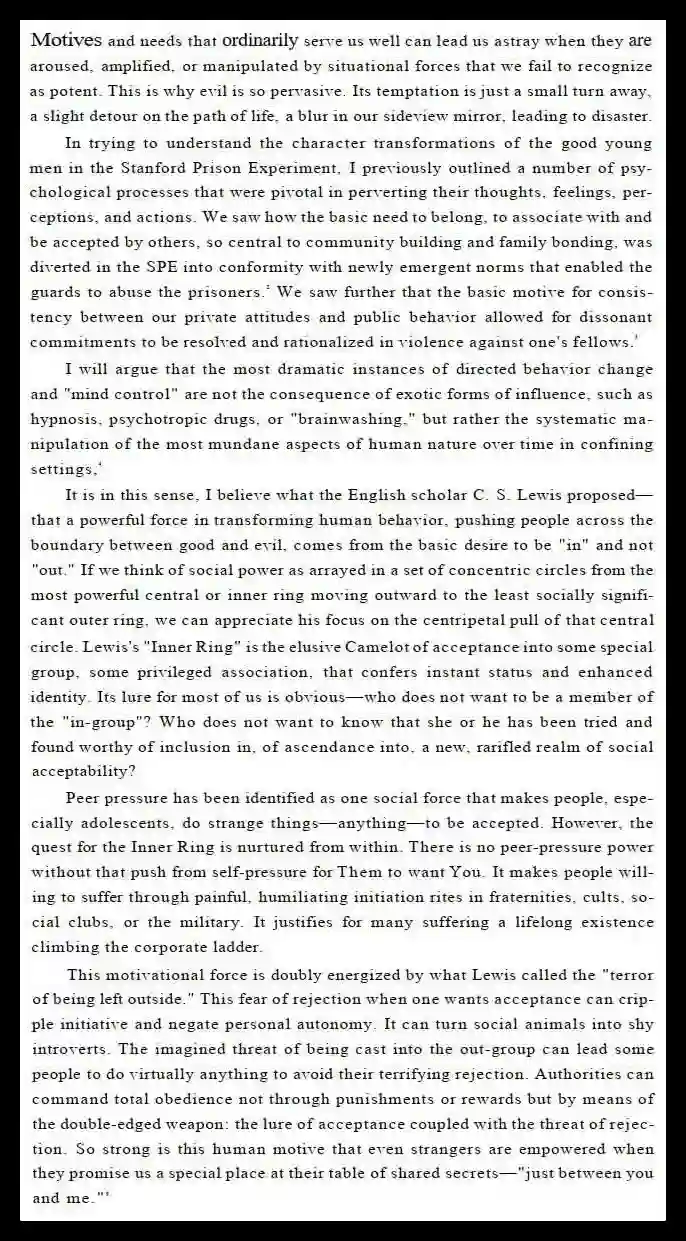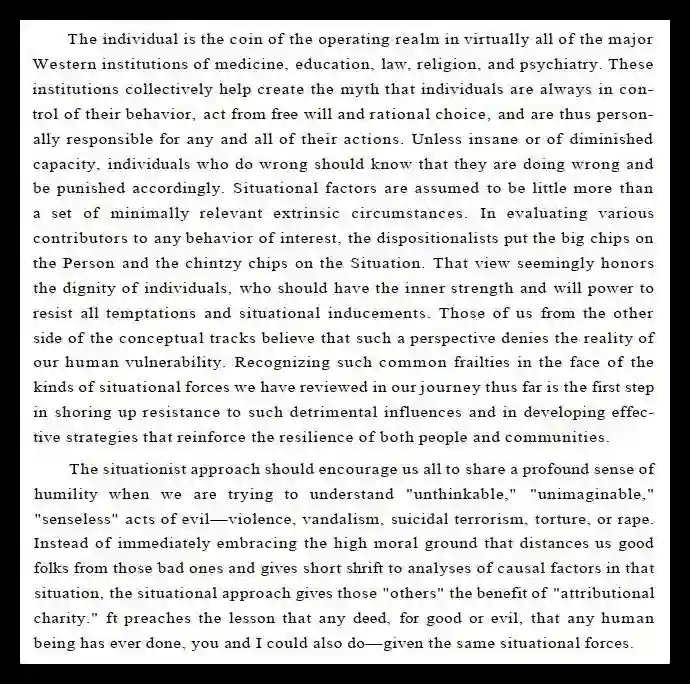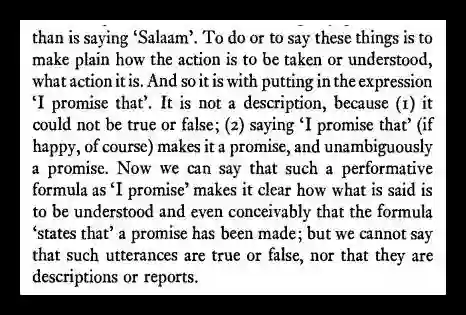Reflecting on Social Practice as Research: The Ragged University Project
The following is a piece of work focusing on ‘Practice as Research’ which I wrote whilst on a Masters course at Queen Margaret University. All the work I have done whilst on the course has been work which has been published in more extended, annotated forms on the Ragged University website.

Each piece also maintains a thread of continuity which I planned as a collection of works, or from another viewpoint, one complete work. All the work is work which I have been thinking about prior to the course and originates outside of the institution, as I believe all ‘education/learning’ is.
Table of Contents
Introduction
The work here has been prompted and shaped by the work of Anthony Schrag who teaches perspectives known as ‘Practice as Research’. As an assignment we were asked to reflect on our practice, whatever it is, and write an essay about it.
I chose Ragged University as for the last fifteen years or more, been something I have practiced as a means of structuring learning opportunities outside of formal education, in the community.
It was a surprise to me to have discovered I enjoyed what I had previously considered formal education, in particular because I had had such a miserable time in school encountering the institutional settings absurd, punitive, and antisocial.
Some years ago, long before I was invited onto the present Masters course, I was in a conversation with David Somervell at the University of Edinburgh. On discovering that I had no formal qualifications he asked me if I thought my teachers had failed me, I replied “I dont see my teachers having failed me, but more that the educational system failed me”. What I mean by that I am unpacking more articulately in this age implicating the organisational structures as shaping behaviours and outcomes.
On passing the assignment you read here, I was interested in finding the person who marked it that they found it a good piece of work but would have liked to hear how the learning which goes on through the social practice of Ragged University compares with that found in Queen Margaret University.
Where there just was not sufficient space to do that in 3300 words, but, all through the period which I have been studying at the university I have been doing a ranging analysis of the environment, the systems, the experience and the education so that I may make reflections and comparisons with what I have been doing through Ragged University.
The result is going to be a fairly lengthy report that goes into some detail as over the years in the anomie of Britain I have found that intellectualising the sociological structures of the country I have encountered as both a salve and a process of personal human development. These works have taken advantage of natural experiments in administrative reform which abound.
Often this approach has provided me with the opportunity to spin gold from a turd, generate a social document of a particular time and place, and sometimes as a therapeutic to mitigate chronic and unremitting stress all whilst affording me the methodology to open myself up to the world approaching it head on.
That analysis of the Queen Margaret University experience will be the final thing I publish whilst being a student studying there, but it will also be a reflection more widely on the intersecting institutional structures, their functions and roles in society, their effectiveness and effects, and more broadly and significantly, it will be a commentary on education as it appears to be structured in our time and place.
This work will further inform the project of Ragged University which is to research, learn and practice forms of higher education which can exist beyond finance and financialism in decentralised ways so that individuals may construct processes of human development utilising the means available to them.
Reflecting on Social Practice as Research
Reflection speaks of serious thought about something. In this essay I share my reflections on a practice I have been involved in through my work developing the Ragged University, relating it to Practice Research approaches (Costley & Fulton 2019).
COSTLEY, C. AND FULTON, J. (2019) Methodologies For Practice Research Approaches For Professional Doctorates. Sage.
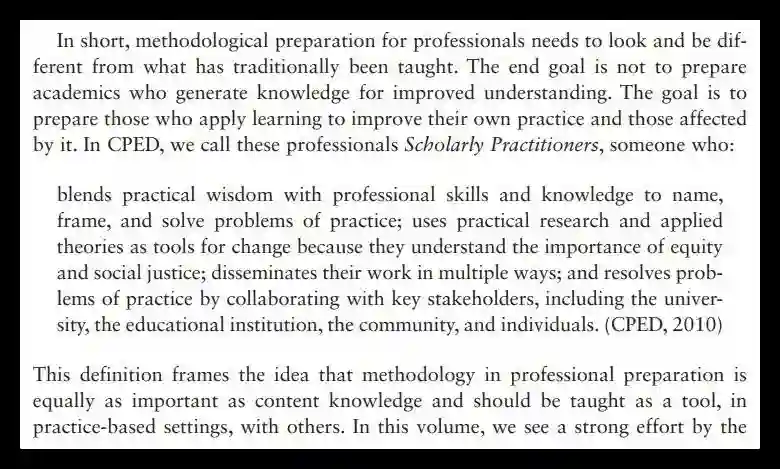
Practice Research offers different ways of building knowledge and creating works which have performative aspirations (Austin 2020) beyond the making of the work [poiesis (Levine 2009,p.20)].
AUSTIN, J. L. (2020) How To Do Things With Words. Barakaldo Books. Page 7
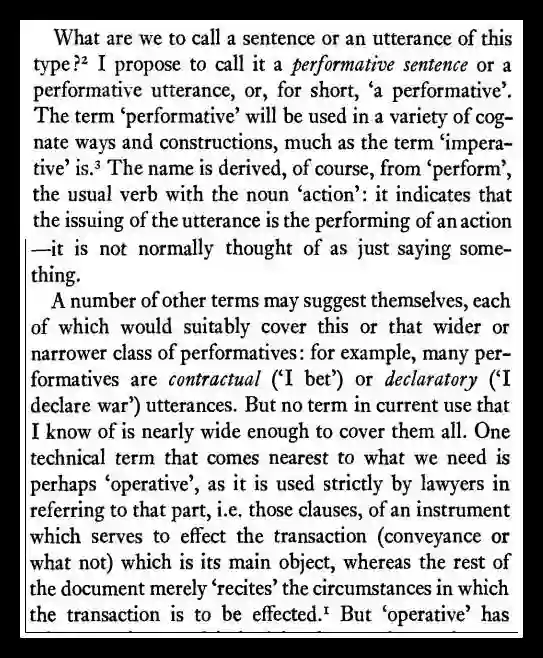
LEVINE, S. K. (2009) Trauma, Tragedy, Therapy: The Arts And Human Suffering. Jessica Kingsley Publishers.
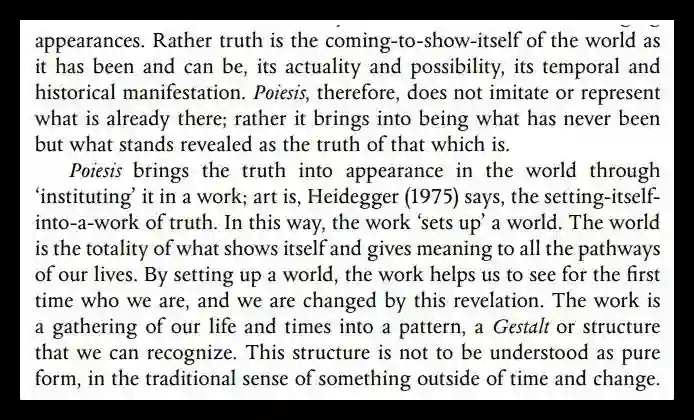
Haseman (2006) articulates the “practice” in “practice-led research” as a necessary pre-condition for performative research – a nuance which shifts focus from the practice of performance into thinking about outcomes as forces in the world; what Austin (2020,p.101) discusses as consequential effects (the perlocutionary activity of an expression).
HASMAN, B. C. (2006) ‘A Manifesto For Performative Research’, Media International Australia Incorporating Culture And Policy: Quarterly Journal Of Media Research And Resources, 118, 98–106.
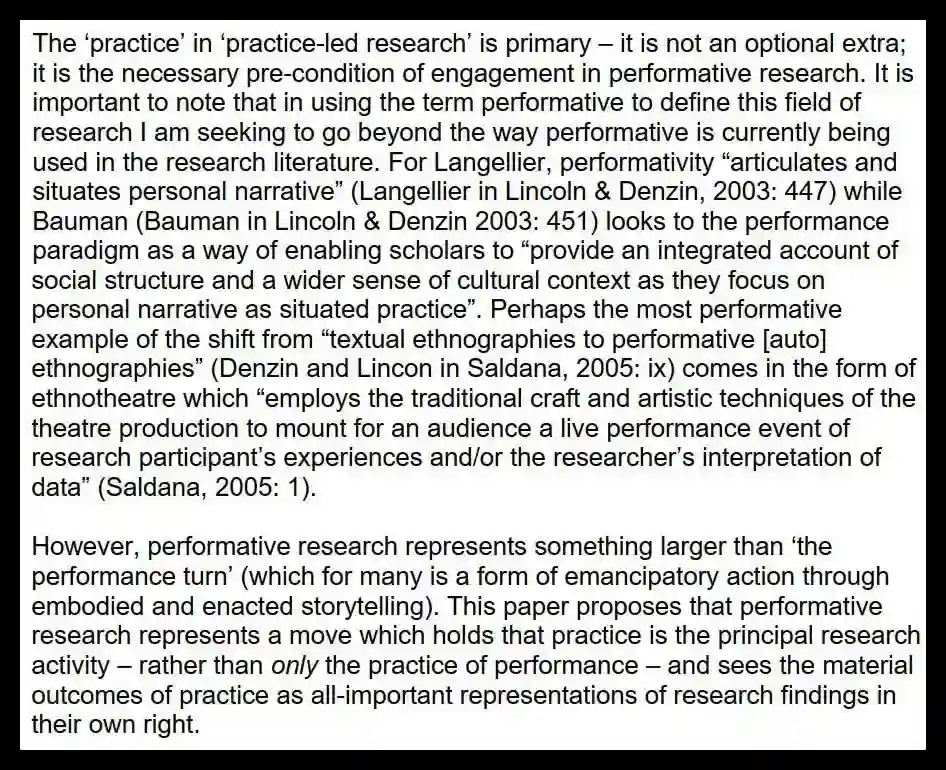
AUSTIN, J. L. (2020) How To Do Things With Words. Barakaldo Books. Page 101
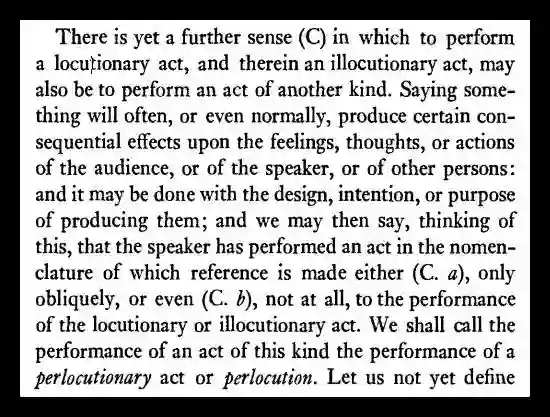
What people/we say and what people/we do are separate things in a relationship and the relationship must be reflected on in order to understand truth-value in the world/context; hence Practice Research is inherently involved in trying to get at knowledge which has truth-value.
In this context Piotrowska (2020) identifies how the subjective realm has an important role in knowledge production also suggesting Practice Research as placemaking for outside perspectives in a hegemonic culture of Neoliberal ideation.
PIOTROWSKA, A. (2020) ‘Complexities, Compromises And Complicities’ In Creative Practice Research In The Age Of Neoliberal Hopelessness. Edinburgh University Press. Doi: 10.1515/9781474463584.
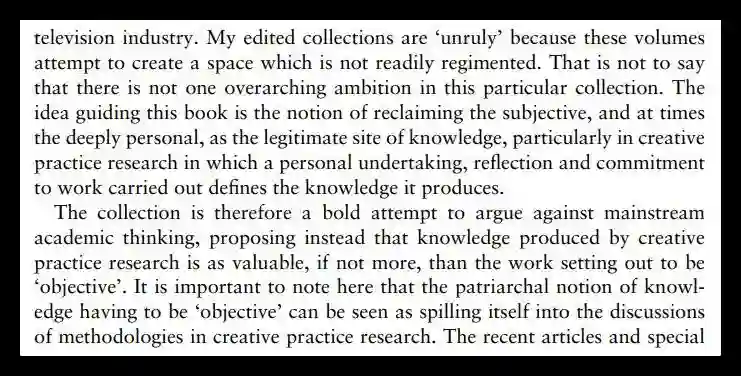
Criticality as a part of reflection on process is suggested by Nelson (2023,p.29) as a fundamental part of research which subtly distinguishes it from practice. Nelson identifies how in the Practice as Research paradigm critical reflection is an imperative element; this dynamic is shared in Action Research approaches as a related methodology.
Nelson, R. (2013). Practice as research in the arts: principles, protocols, pedagogies, resistances. Palgrave Macmillan.
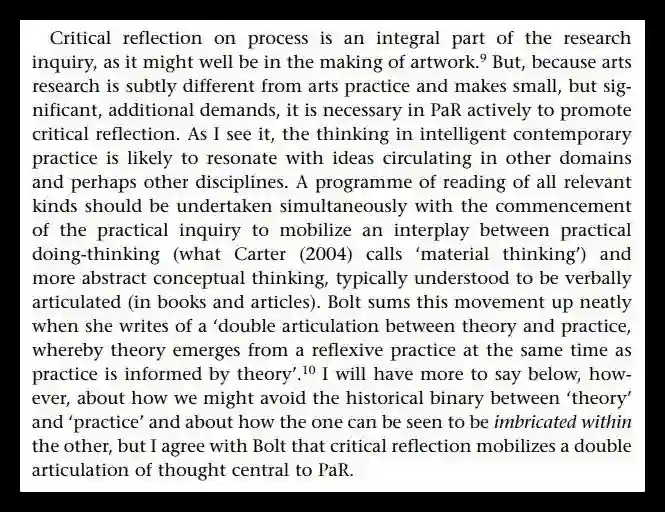
As I reflect on a personal practice of pedagogy in this assignment, I critically consider my failures with respect to Ragged University and how these have been learning yardsticks essential for re-orienting and re-iterating my practice. Specifically, I discuss the project of relating education to human development and Transformative Learning (Calleja 2014) which resists financialism.
CALLEJA, C. (2014) Jack Mezirow’s Conceptualisation Of Adult Transformative Learning: A Review. Journal Of Adult And Continuing Education, 20, 117-136. Doi: 10.7227/Jace.20.1.8.
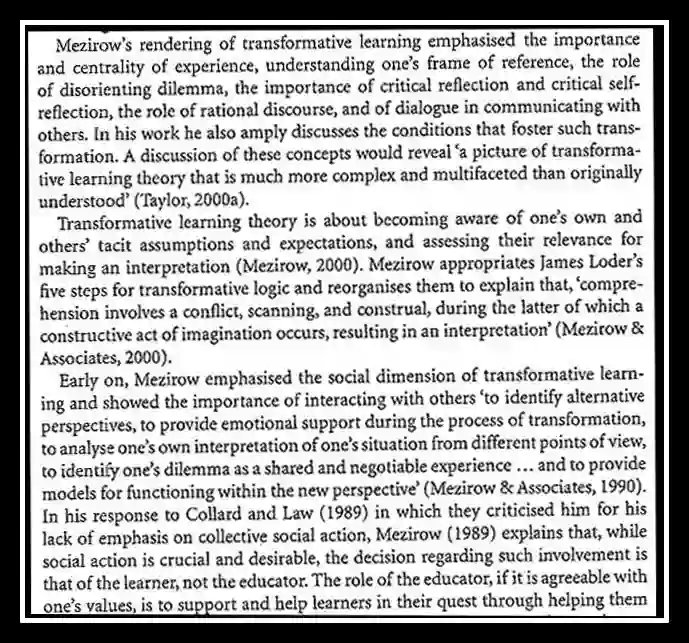
In terms of Practice Research, this speaks to the ‘reflection-in-action’ during the living process which Schön (1983) describes as the core of practice and which Schön associates with ‘being present’.
‘Being present’ and contemplative in the interactions which constitute Ragged University activities is something I do in the everyday. This has involved reflecting on human development as relating to nurture behaviours which build capabilities and translate practically to health and wellbeing.
In this essay I bring together reflections from fifteen years of practice in the Ragged University project and what I have learned through embodying social practices of education. As a project Ragged University has engaged with various experiments and gone through numerous evolutions in order to adapt to the fractured sociology of the postmodern colonial period we find ourselves in (Shaxson 2018; Dunedin 2024).
SHAXSON, N. (2018) The Finance Curse: How Global Finance Is Making Us All Poorer. The Bodley Head. Page 66 and 257
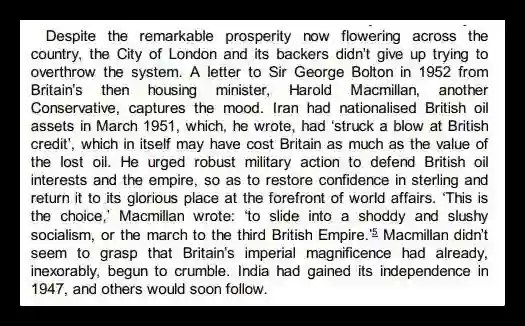
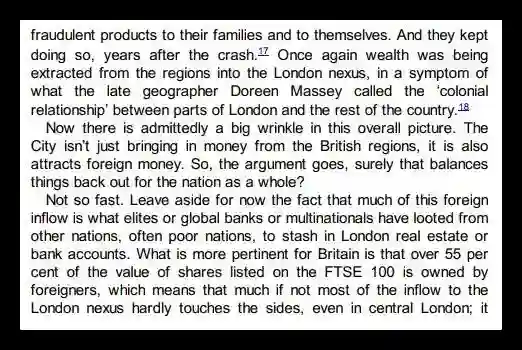
Click here to download introduction
Dunedin, A. (2024). Widening Participation in the Neoliberal University – Ragged University. Ragged University. https://raggeduniversity.co.uk/2024/09/04/widening-participation-in-the-neoliberal-university/
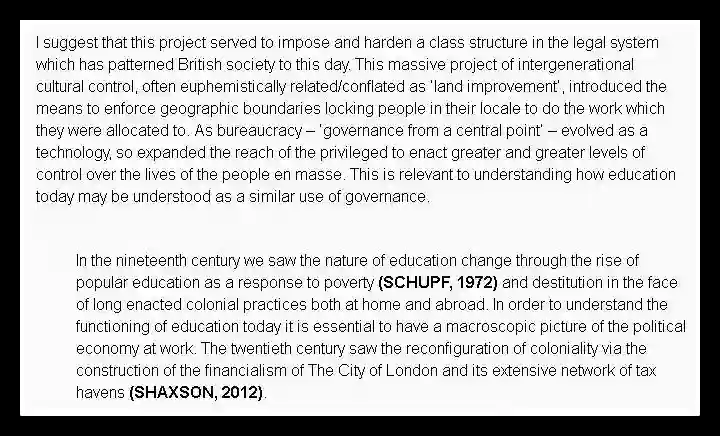
This practice of experimentation and evolution is alluded to by Smith and Dean (2009) as an “Iterative Cyclic Web” in Practice Research which indicates the need to move between different modes of parsing experience in order to build understandings of complex phenomena.
SMITH, H. AND DEAN, R. (EDS) (2009) Practice-Led Research, Research-Led Practice In The Creative Arts (Research Methods For The Arts And Humanities). Edinburgh University Press. P. 45.
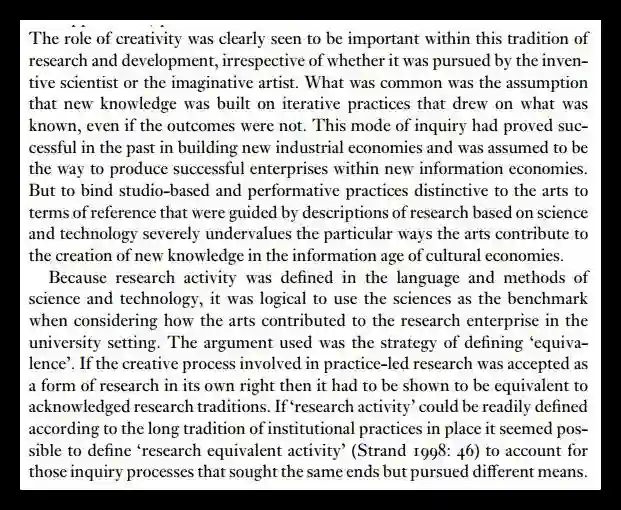
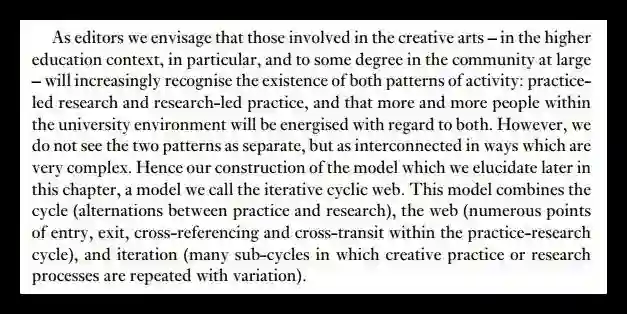
This practice of iteration also appears as a feature of Action Research (O’Brien 2001) which holds at its heart the aim to bring about generative change in a given context.
O’BRIEN, R. (2001) “An Overview Of The Methodological Approach Of Action Research.” In: RICHARDSON, R. (ED.) Theory And Practice Of Action Research. Joao Pessoa, Brazil: Universidade Federal Da Paraiba. (English Version) Available At: Http://Www.Web.Ca/~Robrien/Papers/Arfinal.Html
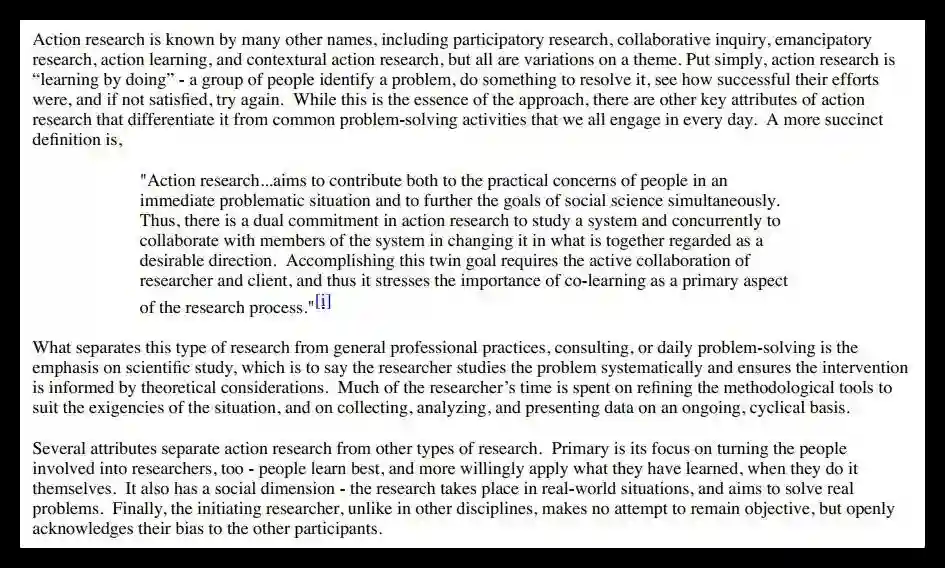
In the Ragged context, the aims have always been to create generative changes in peoples lives that come from educational activities existing beyond the constraints of the dominating economic model (Williams, Shaw, and Schrag 2021) which concentrates wealth through exclusivity/exclusion.
WILLIAMS, F., SHAW, B., AND SCHRAG, A. (2021) Enstranglements: Performing Within And Exiting From The Arts In Health Setting. In: A Critical Appraisal Of Arts In Health Research, Frontiers Of Psychology – Health Psychology, 12. Article 732957. Doi: Https://Doi.Org/10.3389/Fpsyg.2021.732957.
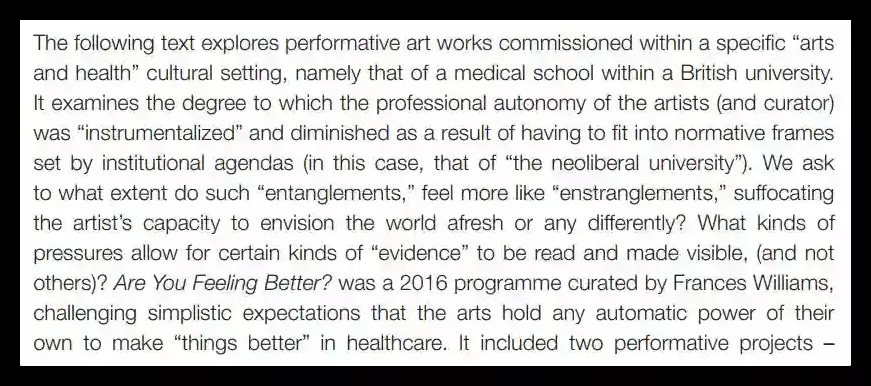
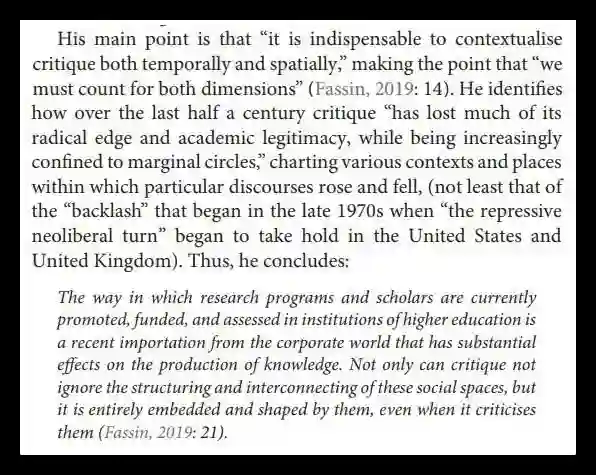
The motivations for configuring Ragged as a project of education in this way originate in the artificial poverty which is manufactured by political choice (Alston 2020).
ALSTON, P. (2020) Do Human Rights Investigations Matter? The Case Of The Un Special Rapporteur On Extreme Poverty. 8 November. Available At: Https://Www.Youtube.Com/Watch?V=Lgxry7pyitu (Accessed: 31 Dec 2024).
Do Human Rights Investigations Matter?
“And so the actual choice of countries, in some ways I was lucky because obviously China, the United States, United Kingdom, well the US and the UK came from my belief that we should not only do what Nikki Haley would like us to do which is to go to the poorest countries in the poorest continents and hammer away at them but to emphasize the theme that I’ve always pushed which is that poverty is a political choice.
Poverty could be eliminated in virtually every country if the political elite actually wanted to do that, but they don’t, they consciously don’t. They want the money for themselves. And so looking at the US and the UK where you’ve got very wealthy economies, they have lots of choices but they still opt to have 15% or whatever of their population living in poverty so I thought it was very important to convey that message and document the linkage.”
Quote from Philip Alston 23 min 28 seconds into the video ‘Do Human Rights Investigations Matter? With Prof Philip Alston, UN Special Rapporteur on Extreme Poverty; the worlds most cited Human Rights scholar.
At the heart of the endeavour is the need for educational practices relating directly to human development which can thrive beyond financial enclosure and co-opting managerial practices found in formal academia which reproduce class, exclusion, and suffering such as Value Added Measures assessment (Amrein-Beardsley 2014), marking students down to fit projected grade curves (Yeritsyan, Mjelde, & Litzenberg 2022) and Malthusian mythologies of deserving winners and feckless losers (Malthus & Mayhew 2015).
AMREIN-BEARDSLEY, A. (2014) Rethinking Value-Added Models In Education: Critical Perspectives On Tests And Assessment-Based Accountability. New York: Routledge. Page XV and 56
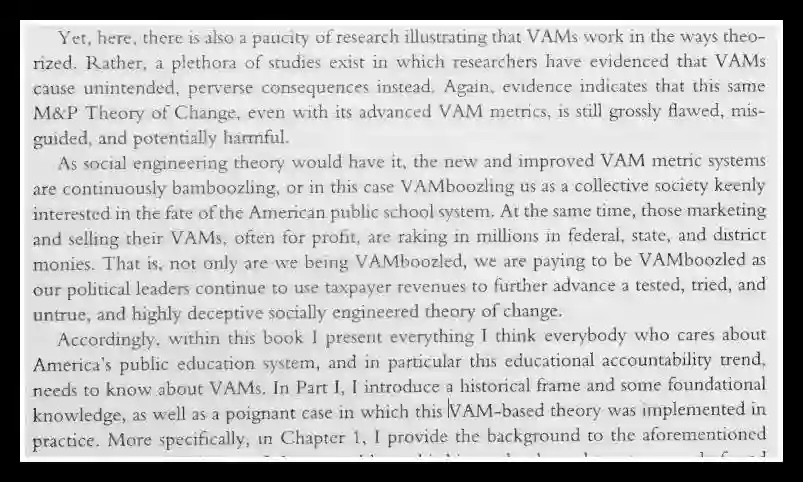
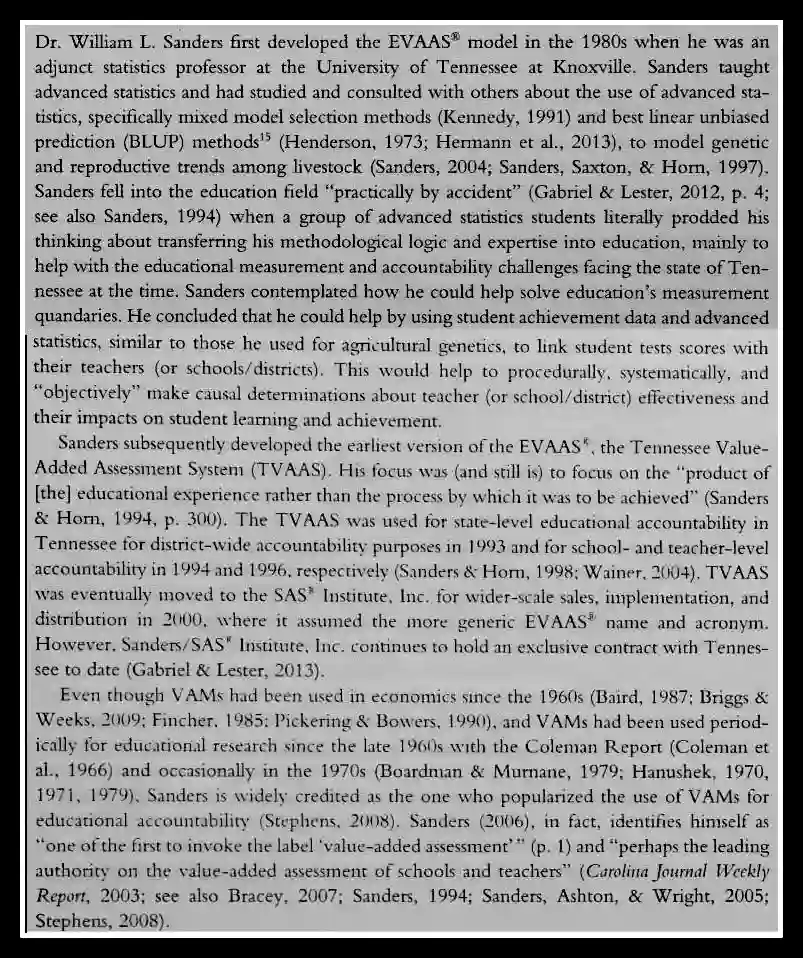
Click to download preface and introduction
Yeritsyan, A., Mjelde, J. W., & Litzenberg, K. K. (2022). Grade Inflation or Grade Increase. Journal of Agricultural and Applied Economics, 54(2), 375–393. https://doi.org/10.1017/aae.2022.15
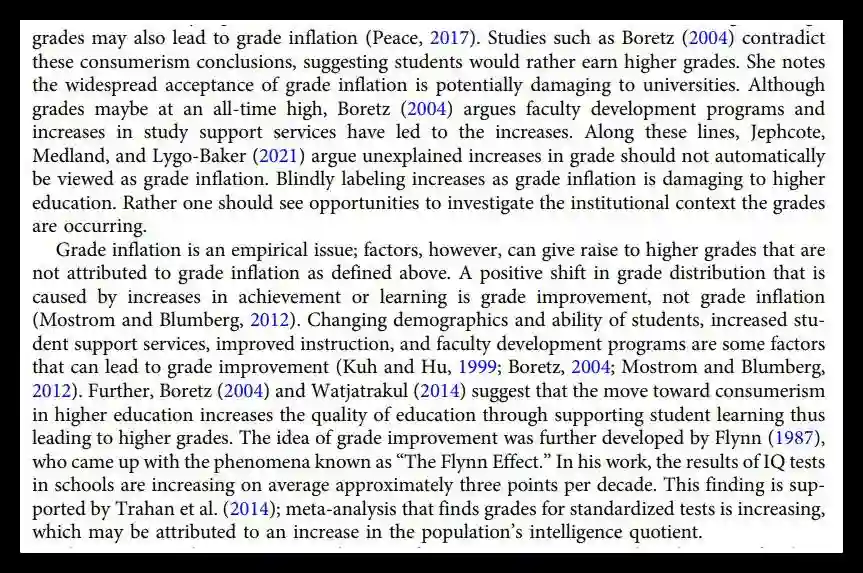
MALTHUS, T. R. AND MAYHEW, R. J. (2015) An Essay On The Principle Of Population And Other Writings. Penguin Books.
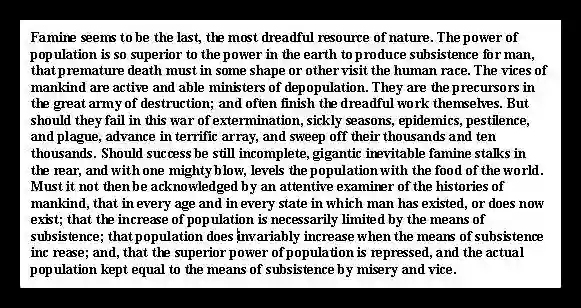
Context and Origins of Practice
Ragged University is named after the histories of the Ragged Schools movement (Montague 1904) in which individuals, communities and philanthropists banded together in order to share knowledge and produce structured learning opportunities for all children. Ultimately the movement demonstrated the cultural benefits of free education over decades impressing the society of its time.
MONTAGUE, C. J. (1904) Sixty Years In Waifdom; Or, The Ragged School Movement In English History. Patterson Smith.
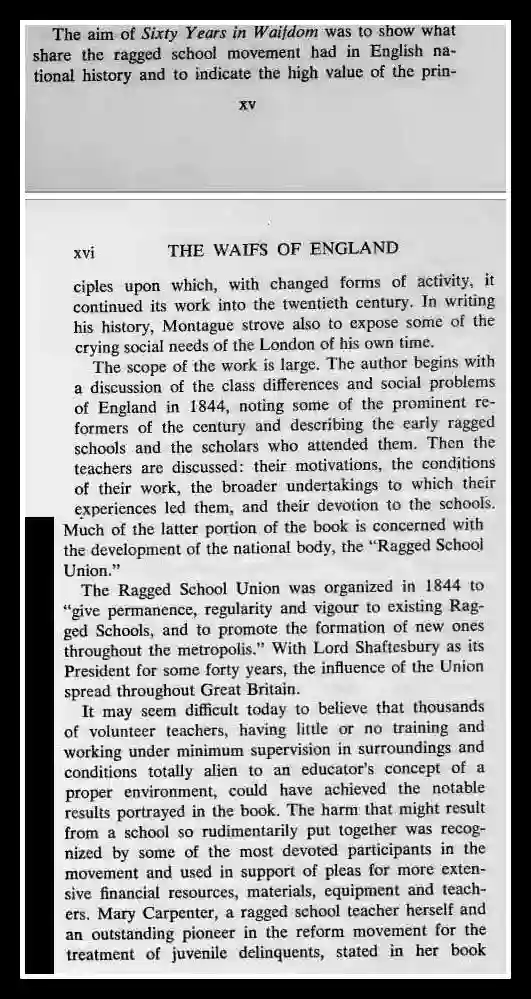
Out of these social practices the 1870 Forster Education Act was eventually passed absorbing the infrastructure created by communities, bankrolling teaching and providing universal education for children. Since then free primary school education has been a fixture of British society feeding into a range of positive human development outcomes.
In the context of the current epoch, poverty in Britain has soared (JRF 2024; Dorling et al 2007; Birt et al 2024) revealing new technocratic and contemporary forms of destitution (Deaths by Welfare Project n.d.; Clifford 2020; Pring 2024), many of which lack lexical handles which allow them to be discussed properly.
JRF (2024) Uk Poverty 2024: The Essential Guide To Understanding Poverty In The Uk. Joseph Rowntree Foundation. Available At: Https://Unionsafety.Eu/Elibrary/Media/Elibrarymedia/Ukpoverty2024josephrowntreefoundation.Pdf.
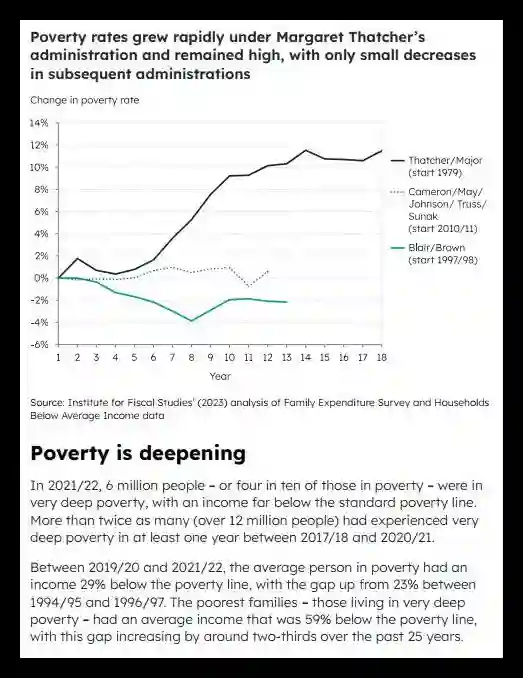
Dorling, D. (2007) Social harm and social policy in Britain Chapter 10 in, R. Roberts and W. McMahon (eds) Social Justice and Criminal Justice, London: Centre for Crime and Justice Studies. (pp. 122-135)
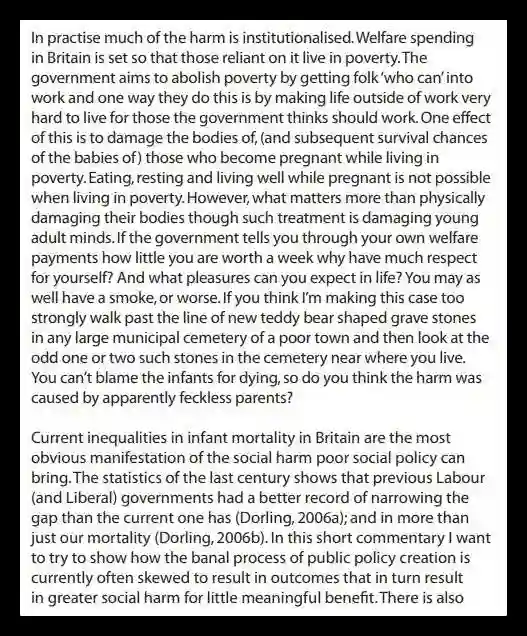
Click here to download chapter
BIRT, C., CEBULA, C., EVANS, J., HAY, D., AND MCKENZIE, A. (2024) Poverty In Scotland 2024. This Year Our Report Asks How Effective Social Security Is At Reducing Poverty And Advancing Equality In Scotland.
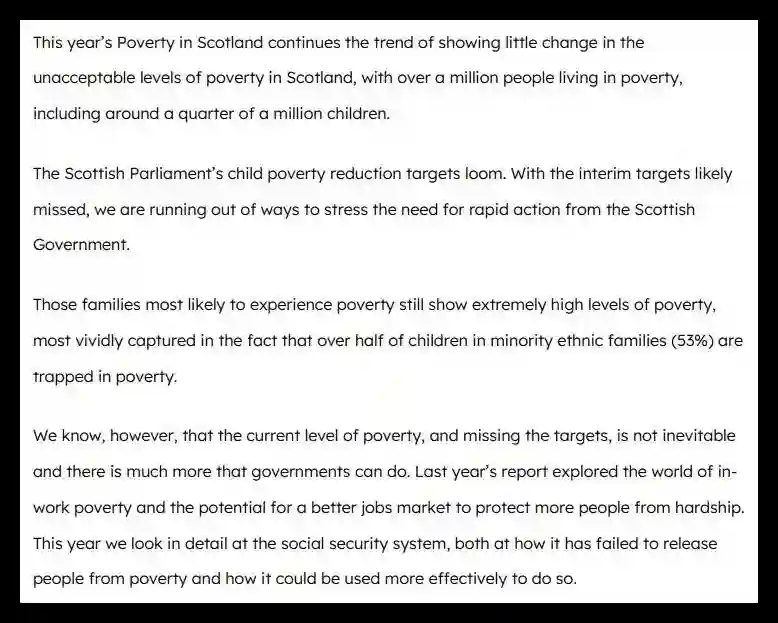
DEATHS BY WELFARE PROJECT (N.D.) Available At: Https://Deathsbywelfare.Org/.
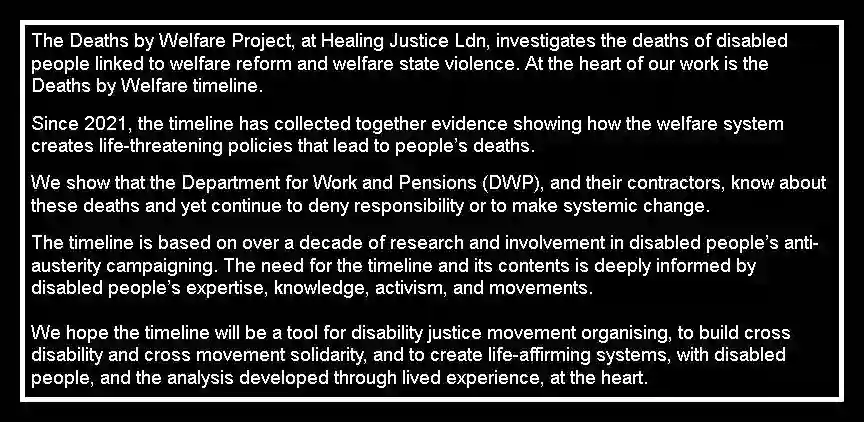
Visit website and archives at Deathsbywelfare.Org
CLIFFORD, E. (2020) The War On Disabled People: Capitalism, Welfare And The Making Of A Human Catastrophe. Bloomsbury Academic.
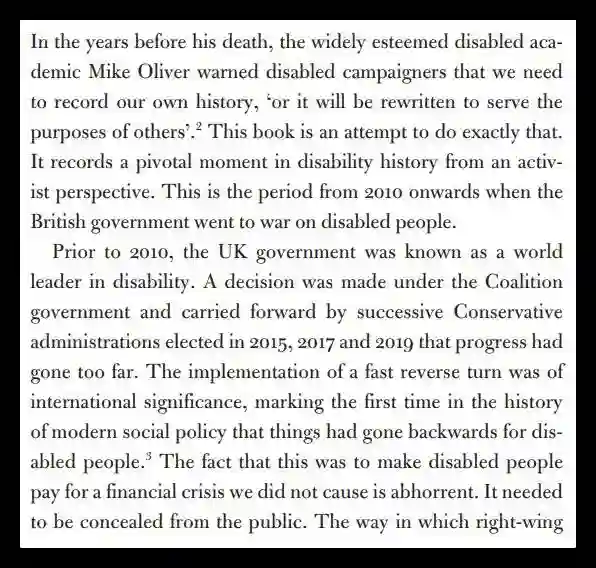
Click to download introduction and chapter one
PRING, J. (2024) The Department: How A Violent Government Bureaucracy Killed Hundreds And Hid The Evidence. Pluto Press. Page 9
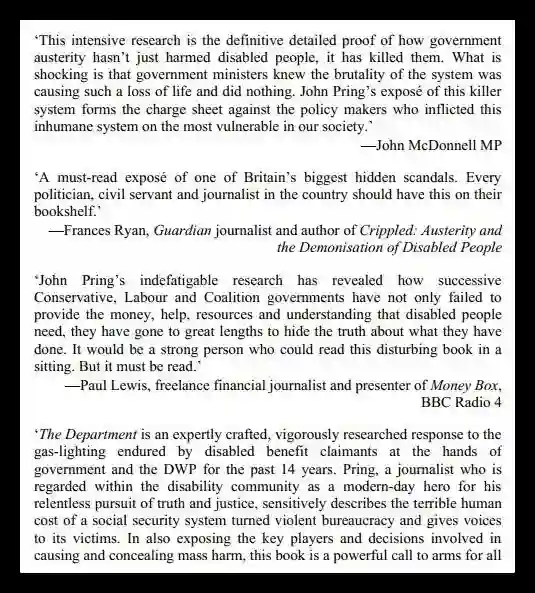
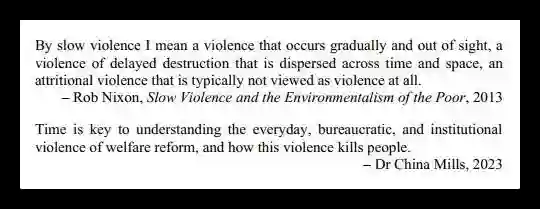
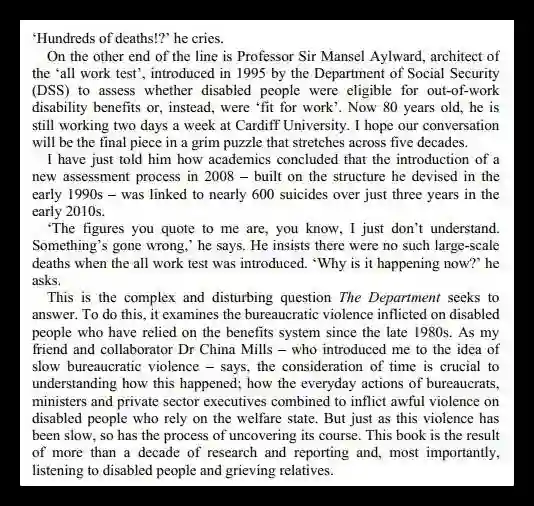
The gap between the rich and the poor (Dransfield 2014) reveals the levels of disenfranchisement against a backdrop of exorbitant concentration of wealth, the development of rigid class and caste structures (TST 2019; Dunedin 2024), production of new and unusual forms of illness (Kutz 2023), and the devastation of the sociological and environmental habitats necessary for humans (along with other species) to thrive.
DRANSFIELD, S. (2014) A Tale Of Two Britains: Inequality In The UK. Oxfam GB. Available At: Https://Policy-Practice.Oxfam.Org/Resources/A-Tale-Of-Two-Britains-Inequality-In-The-Uk-314152/.
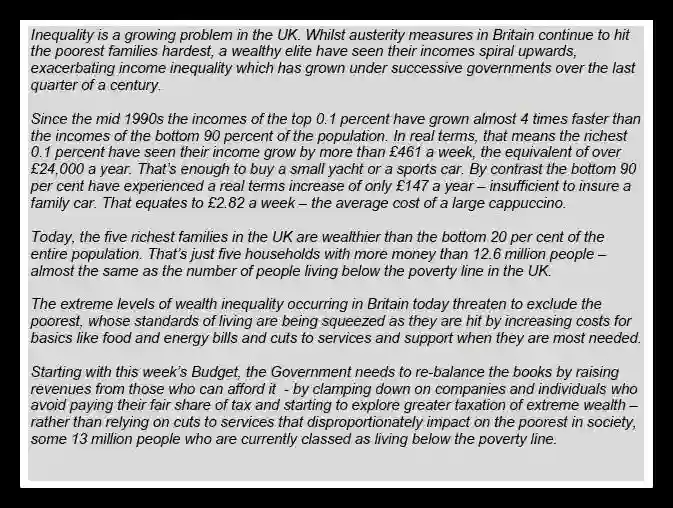
TST (2019) Elitist Britain. The Sutton Trust. Available At: Https://Www.Suttontrust.Com/Our-Research/Elitist-Britain-2019/.
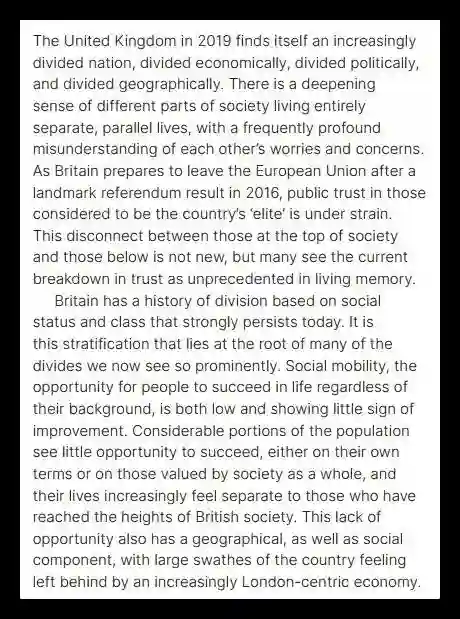
DUNEDIN, A. (2024) Widening Participation In The Neoliberal University – Ragged University. Ragged University. Available At: Https://Raggeduniversity.Co.Uk/2024/09/04/Widening-Participation-In-The-Neoliberal-University/. (Accessed: 18 Dec 2024)
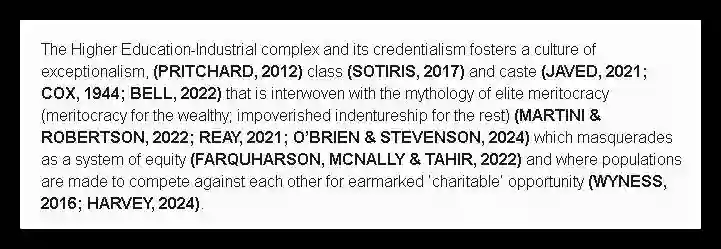
KUTZ, A. (2023) Double Bind-Communication As A Cause Of Burnout: A Proposal For A Theory On The Effects Of Toxic Communication In Organisations. Springer. Doi: 10.1007/978-3-658-40780-3.
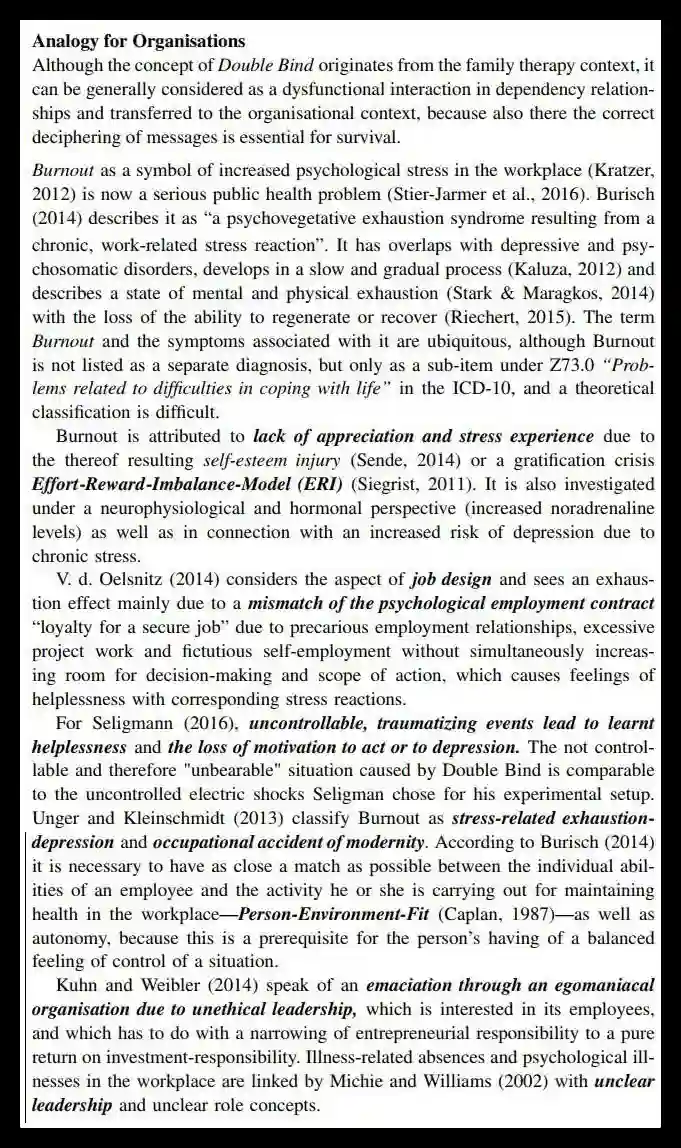
While free primary education has been important to human development outcomes, it has not rid society of poverty and disenfranchisement in a time of highly concentrated wealth. The need for resilient and accessible forms of higher education and lifelong learning appear evident.
It is through understanding this lived context that I started practicing forms of social education in order to respond to the need for human development processes relevant to our context.
Through this journey I have adopted and explored a number of approaches culturally presented as ‘received wisdom’, but, which on interrogation have turned out to hinder the project of education as human development.
Explicitly it is the approaches relating to tenets of ‘scientific management’ and the work of Frederick Winslow Taylor (Locke & Spender 2011) which have engendered so many harms.
LOCKE, R. R. AND SPENDER, J.-C. (2011) Confronting Managerialism: How The Business Elite And Their Schools Threw Our Lives Out Of Balance. Zed Books.
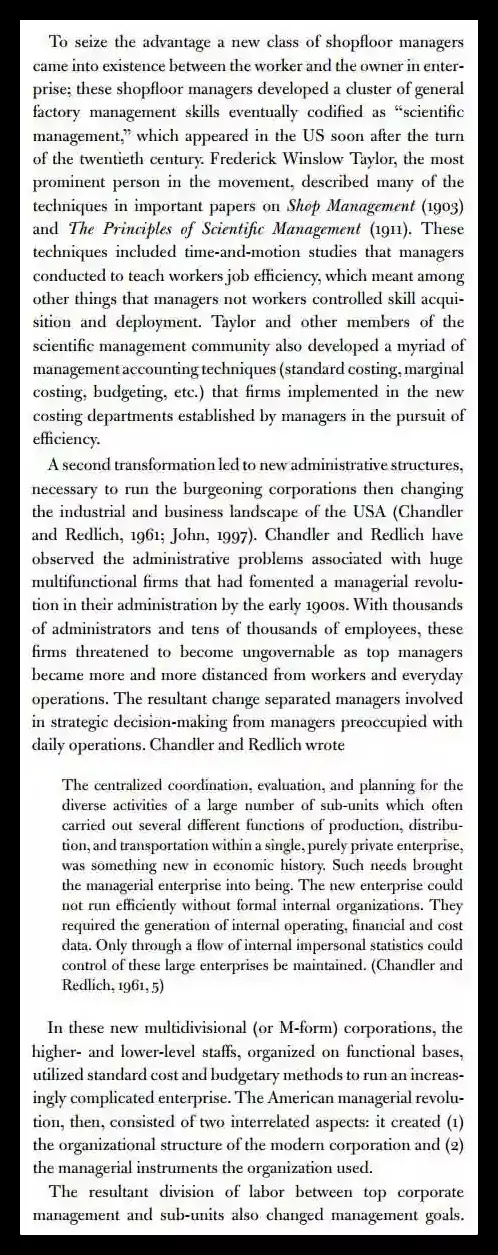
In the next section I reflect on some key moments in the process through the lens of ‘learning through failure’ (Persaud 2011), Participatory Action Research (Swantz 2011) and adaptation through pragmatic research.
Persaud , P. (2011) Twenty-First Century Perspectives On Failure In EDS, HILLSON, D. ‘Failure Files: Perspectives On Failure. Triarchy Press. P. 139.
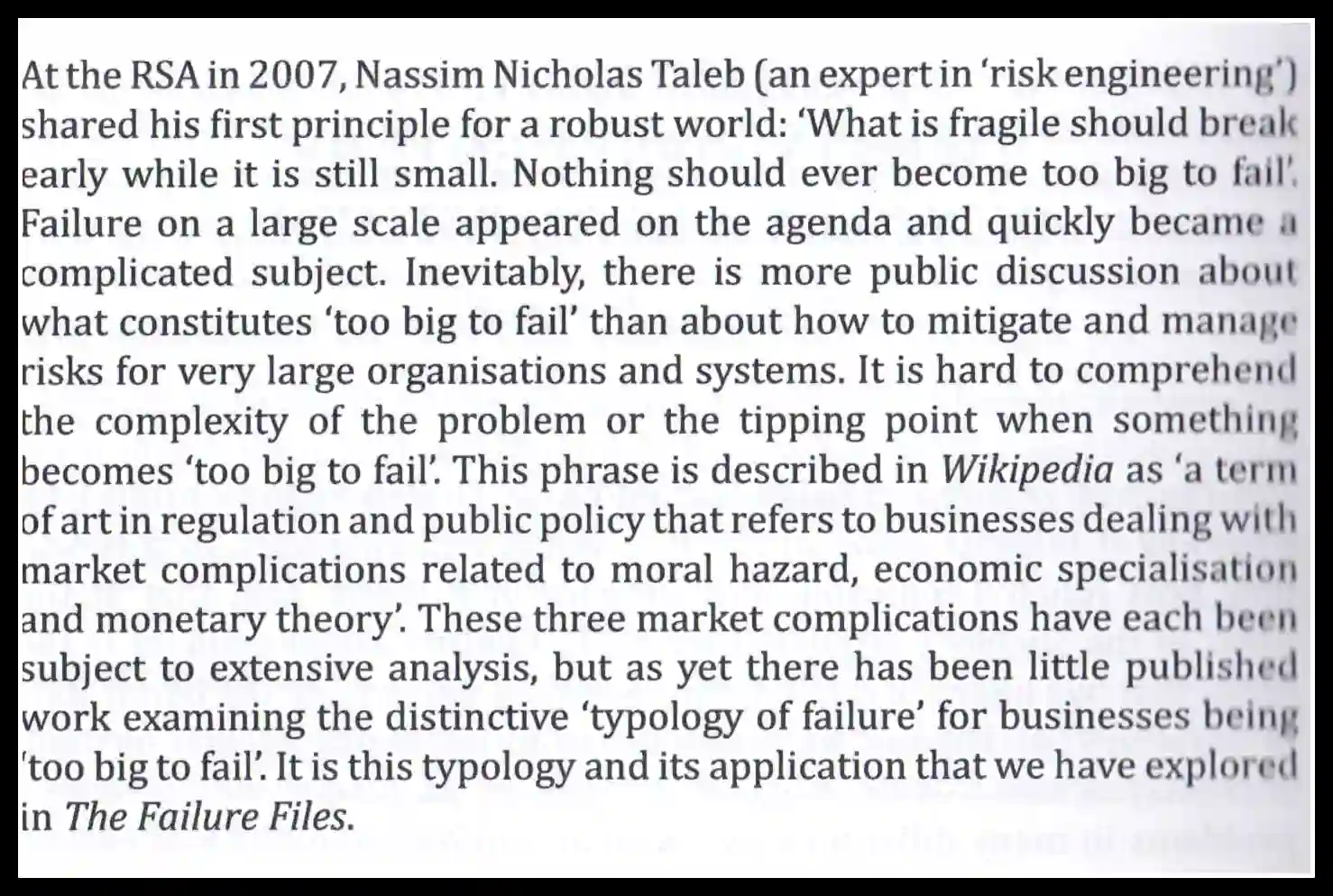
Click here to look inside the book
SWANTZ, M. L. (2011) Participatory Action Research As Practice In REASON, P. AND BRADBURY, H. (EDS) The Sage Handbook Of Action Research: Participative Inquiry And Practice (2nd Ed). Sage. P. 31.
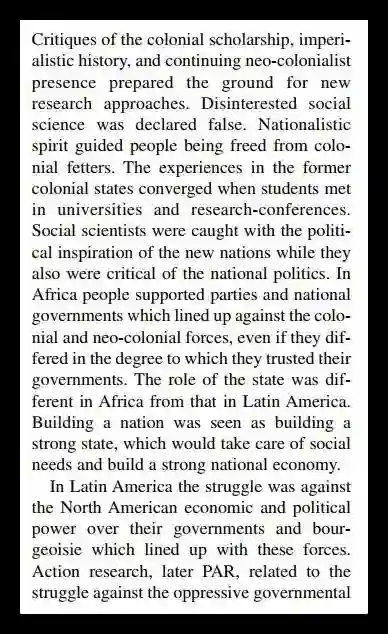
The Embodiment of the Project
In the search for embodied practices of education as relating to human development, the beating heart of the project has been to set up the circumstances for learning through drawing on available infrastructure and common technology.
That is, in order to avoid the fragility and co-option that funding and resource structures produce in sustaining activity, the strategy has been to avoid the instrumentalising chains of dependency produced through centrally coordinated administrative structures and proprietary technologies.
Instead the Ragged strategy has been to develop activity based on the innate affordances of the environs locating the generative element (making/poiesis) of education in the interpersonal relationship. In other words, develop activities around what an environment supports understanding learning as taking place through the dialogical interaction amongst people.
In material terms, this has meant utilising what Ray Oldenburg coined as ‘Third Places’ (Cafes, bookstores, bars, etc) (Oldenburg 1997); places of nature Rabindranath Tagore (Tagore 1967 p. 75), and spaces of public value such as libraries (Moore 1995) to convene learning activities. All are such locations that have the characteristics of “being open to everyone and where people negotiate and renegotiate the values operating in them” (Brown 2014).
OLDENBURG, R. (1997) The Great Good Place: Cafes, Coffee Shops, Community Centers, Beauty Parlors, General Stores, Bars, Hangouts, And How They Get You Through The Day. New York: Marlowe.
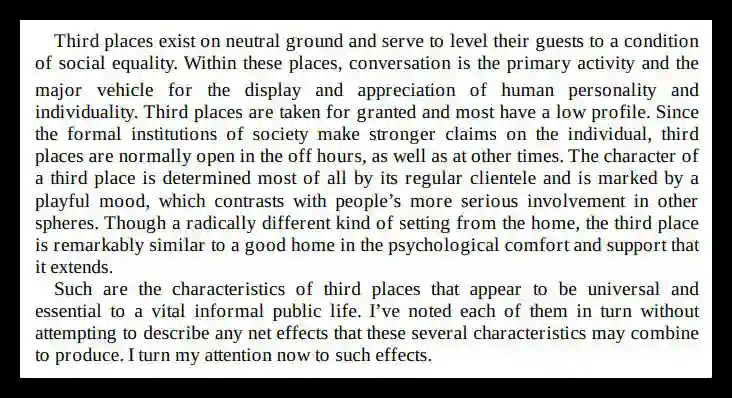
Click here to download introduction and chapter one
TAGORE, R. (1967) Towards Universal Man. Asia Pub. House.
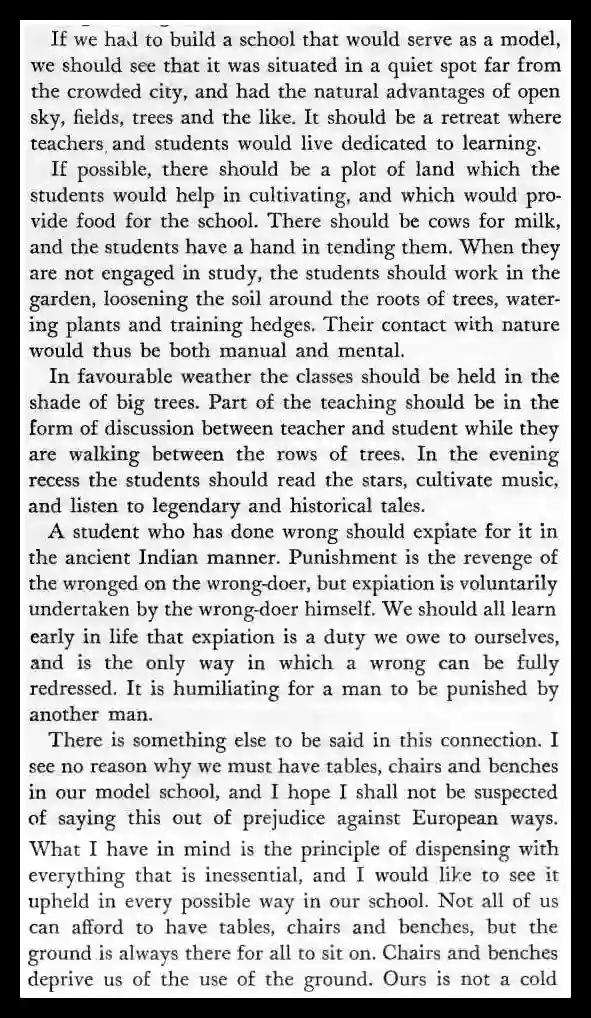
MOORE, M. H. (1995) Creating Public Value: Strategic Management In Government. Harvard University Press.
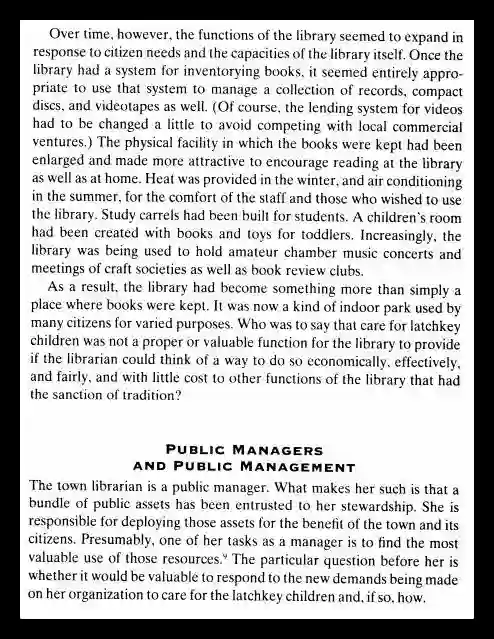
In non-material terms, this perspective holds that wisdom is held in the people rather than sequestered in formal educational institutions. It turns instead on some of the oldest contiguously standing ideas of the university as a charitable charter of mutual support effecting a guild of students, and where the educators were citizens who entered into the studium to share their knowledge and draw out expertise in the readers (Rashdall 1895).
RASHDALL, H. (1895) ‘The Universities Of Europe In The Middle Ages: Salerno, Bologna, Paris’. Clarendon Press, P. 148–161.
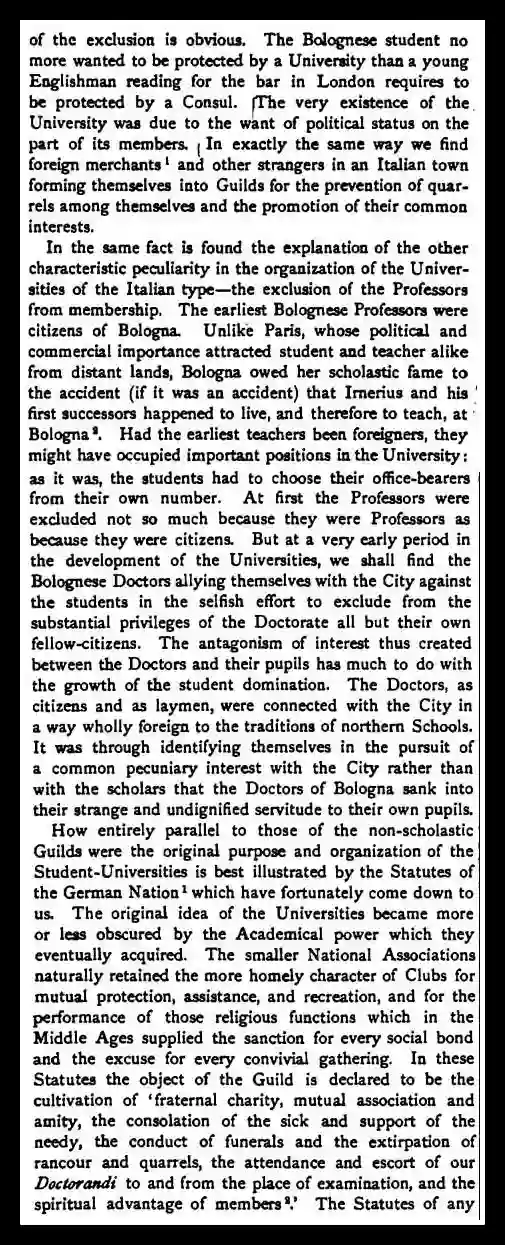
In de facto terms the project and fundamental practice of the Ragged University project came from grounding in the histories of open learning (Dunedin 2022) and the intellectual richness and social generosity of a group of friends.
I was to learn from the practice of others how the ‘Ragged University’ could become a practical reality when my friends (Jes Haley, Grant Crozier and Will Bentinck) produced the first public event from which the living process was modeled.
They organised the use of space in a public house called ‘The Palatine’ in Hackney, London. Will and Grant each gave a talk on subjects they were passionate about and where everyone was welcomed to listen and ask questions.
DUNEDIN, A. (2022) History – Ragged University. Ragged University. Available At: Https://Raggeduniversity.Co.Uk/About/History/. (Accessed: 16 Dec 2024)
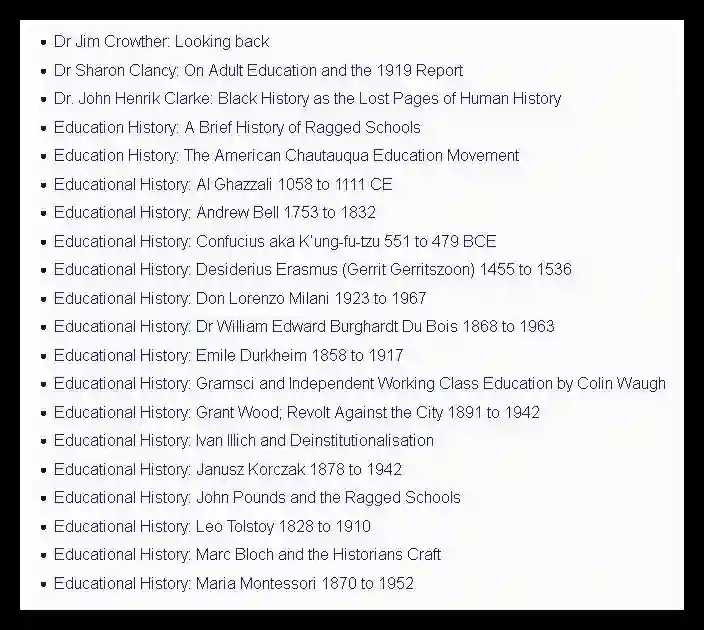
Nelson (2023 p.40) discusses learning through practicing with others as producing kinds of know-how which reveal embodied knowledge that is otherwise invisible. I discuss this in the project as “Being in Relation with Other” relating it as an integral part of notionalising Education as Human Development (Dunedin 2019). Nelson (2023,p.44) articulates the imperative for critical reflection as the key method of producing know-what from know-how; a process of informed reflexivity interrelating making and sensing (modes of knowing).
Nelson, R. (2013). Practice as research in the arts: principles, protocols, pedagogies, resistances. Palgrave Macmillan. Page 40

Click here to download introduction
Dunedin, A. (2019, May 3). Education as Human Development. Ragged University. https://www.raggeduniversity.co.uk/2019/05/03/education-as-human-development/
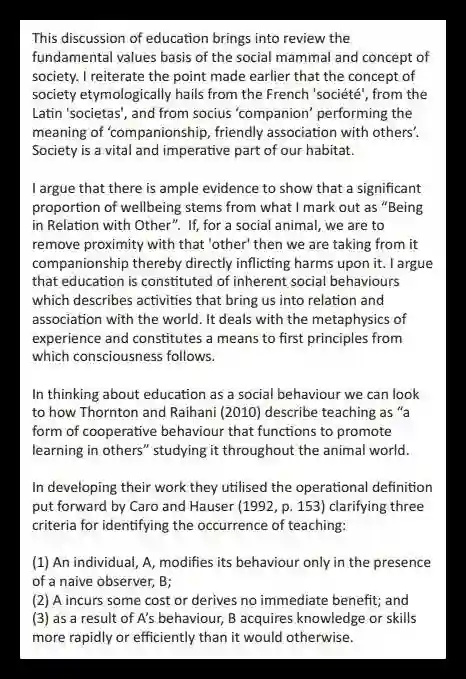
Nelson, R. (2013). Practice as research in the arts: principles, protocols, pedagogies, resistances. Palgrave Macmillan. Page 44
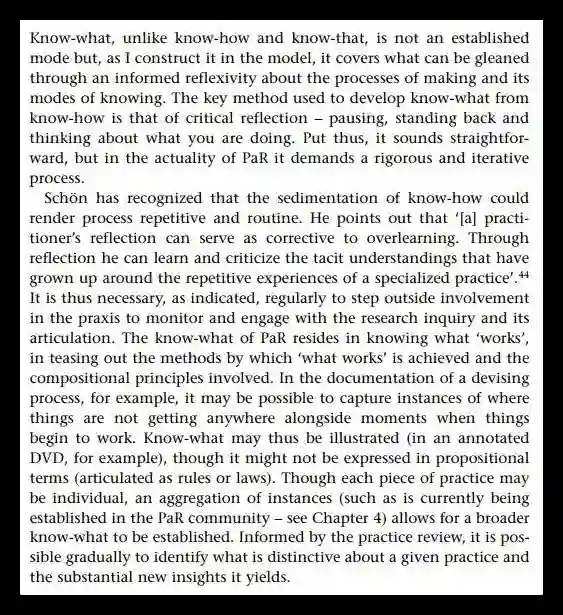
It was this pivotal aspect of praxis which I carried forward for the next fifteen years as I worked to understand how Higher Education might be embodied in the lives of everyone regardless of their means and context. I worked with the premise that as a coordinator of the social practice, the aim was to – over time – embody everything which happens within a formal university through reconfiguration in the world outside the formal setting.
The particular orientation of the project came for me from the constraints of my personal circumstances. I lacked finance and cultural status, and so was interested in practices which tangibly developed human capabilities which were accessible to me and others with similar circumstances feeding into the wellbeing of myself and community.
Ultimately the practice stemmed from being present in the world and paying attention to those around me who were obviously passionate about their subject. Whenever I came across someone who cared deeply about what they spent time on I would engage them in conversation and invite them to share a presentation in an informal space. Money and finance was purposely excluded from the events because it acted as a constraint and structured the dynamics of behaviour in profoundly reductive ways.
I was interested in learning ‘what the world wanted to teach’ and expose myself to reality as it is rather than curating the world as I thought it ought to be. My personal starting point was one of naivety of formal education but one with great interest in learning. I became focused on the philosophy of knowledge and science being interested by the questions which stem from ‘How do we know what we think we know?’. Through active listening, dialogue, exercise and practice I was to start my journey of pragmatic discovery through practice, experimentation and adaptation.
Resilient Methods and Strategies
In this section I share some of the perspectives which allowed me and others to operate and organise without resources and finance. These informed the practice long after organisational practices I adopted and attempted to impose on the social practice had fallen away because they were inappropriate. It is pointed in my mind what Jess Haley was later to feed back to me in a friendly candid response to my implementation of entrepreneurial advice; “managerial bullshit”.
Reflecting on how I developed the legacy practice of Ragged University, there are a number of things which stick out in my mind. A key methodology I had to adopt was informed by working in emergent, chaotic and changing spaces – do what you can, with what you have, when you can, and with who.
I was influenced by a former submariner and club promoter Gordon Barclay in his approach to life where he often cited the axiom: ‘Adapt. Improvise. Overcome’.
Schön discusses reflection-in-action as pivotal to the way practitioners manage “uncertainty, instability, uniqueness and value conflict” (Schön 1983,p.50), a process I increasingly view as involving adaptation and improvisation rooted in reflection.
Another account of operating in what I have come to refer to as a ‘fractured environment’ comes from the General Practitioner and Professor of Addiction Medicine, Roy Robertson. He operates through what he calls “Pragmatic Research”, saying “Pragmatic is a word that the Dutch use very frequently when they mean it’s just an action—it’s something doing stuff. You build it; you call it research, but actually, it’s very motivated by actions” (Robertson 2023).
ROBERTSON, R. (2023) What Research Has Led To Policy Or Practice Change That Improved The Care? By Prof Roy Robertson. Youtube. Available At: Https://Youtu.Be/Lhv_5qtqf90. (Accessed: 23 Dec 2024)
This framing of research I came across through being a part of the steering committee of the Drugs Research Network Scotland and found it had explanatory power for how we are forced to work in chaotic and fragmented environments which do not allow for the fictions of neat and orderly planning. Robertson’s approach reinforced the pragmatics of activity needed in disordered and emergent environments such as the cultural settings of contemporary Britain.
I have also drawn on a quote from Ray Oldenburg which speaks both to embracing critical thinking and to the importance of continuing a practice over time in order to understand complex phenomena. This is very helpful in illustrating that doing things over time is a practical strategy, one which has been pivotal in Ragged:
“It is a human tendency to want to discard or discredit, or simply ‘forget’ uncomfortable facts. They are, however, friends in disguise. They are clues to a deeper understanding of the problem that confronts an investigator, but it takes time to fit the stubborn pieces into the puzzle. By current standards of scholarly production, I spent too much time on this project. Such was the nature of my subject, however, that the extra time turned out to be my best methodological technique.” (Oldenburg 1997)
OLDENBURG, R. (1997) The Great Good Place: Cafes, Coffee Shops, Community Centers, Beauty Parlors, General Stores, Bars, Hangouts, And How They Get You Through The Day. New York: Marlowe.
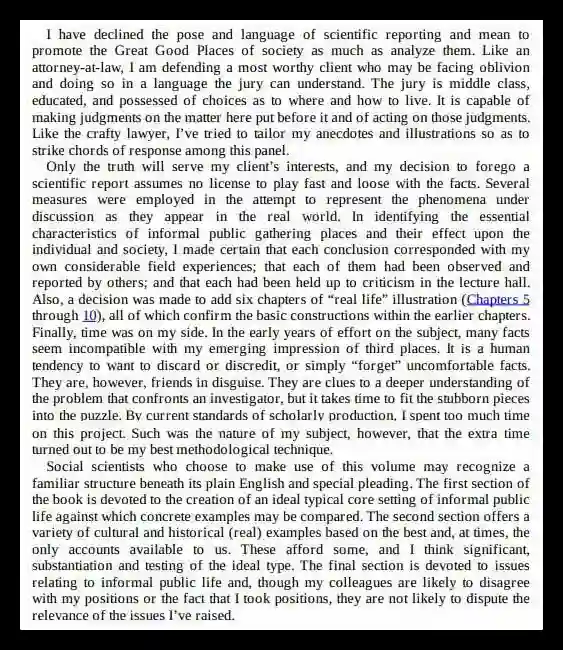
This methodological approach reflects what Albert Einstein said about his cognitive strategy – “It’s not that I’m so smart, it’s just that I stay with problems longer”. These perspectives sit in direct tension with the various iterations of ‘scientific management’ which have been spread by the proliferation of business schools across the world (Locke and Spender 2011).
LOCKE, R. R. AND SPENDER, J.-C. (2011) Confronting Managerialism: How The Business Elite And Their Schools Threw Our Lives Out Of Balance. Zed Books. Page 178
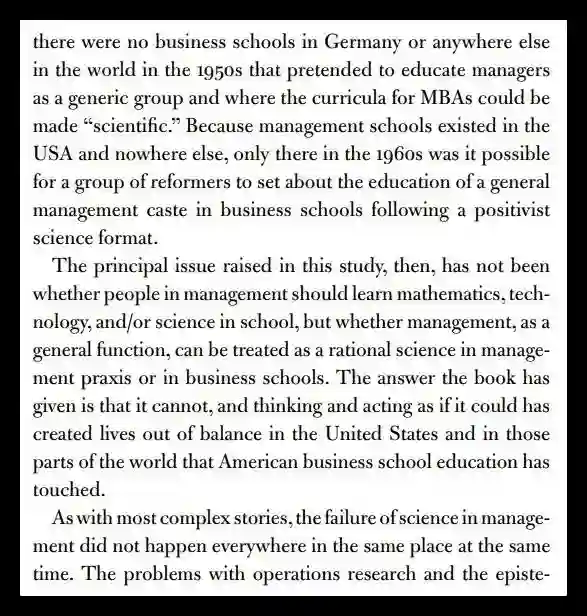
The common fetishes of the likes of S.M.A.R.T plans and PRINCE2 etc, have become so ubiquitous that these ritual renderings of social organisation speak to parallel the reality which Mark Fisher (2022) picked up on in his statement of Capitalist Realism “the phrase attributed to Fredric Jameson and Slavoj Zizek, that it is easier to imagine the end of the world than it is to imagine the end of capitalism”. It seems that culturally society is struggling to imagine how to organise without finance or rendering activity in terms of ‘scientific management’.
FISHER, M. (2022) Capitalist Realism: Is There No Alternative? (Second Edition). Zer0 Books. Page 6.
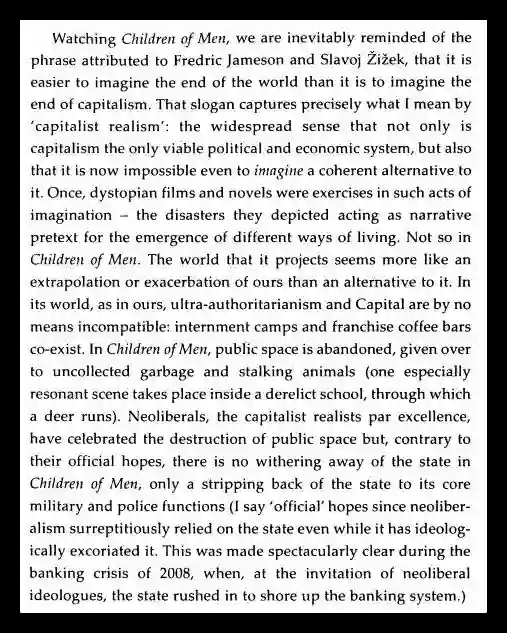
Rather than starting at these critical perspectives, I have arrived at them over time through necessity in order to complete the project of human development I had begun with. In the journey of Ragged University, the practice originated around inherent social behaviours of knowledge sharing.
However, as I encountered new influences, I began to adopt the practices of the entrepreneurial and Third Sector in what was potentially a radical departure from previous practices – a departure that I have reflected on significantly since.
A series of events including being made a member of the Chamber of Commerce, fellow of the Royal Society of Arts, and having a range of interest from Third Sector consultants, worked to reshape my thinking on the concept and practice of Ragged University moving it from an unfunded social practice to something which was funded.
By this time, several years in, a range of people in four different cities had been producing public events and sharing organisational insights which made it easier to arrange activities which were appropriate for the sociological dynamic that occurred in the public spaces. I had been undergoing a transformation produced by the coaching of professional consultants which included a former chief fundraiser of Barnardos. I/we/Ragged even got official charitable status.
My thoughts increasingly turned from thinking about education, human development, pedagogy, individuals, their contexts, the realities of the community to what I was instructed I needed to do in order to get funding for the project. I was to discover how the administrative and bureaucratic practices which were introduced were to change the nature of the outcomes (Dunedin 2014).
DUNEDIN, A. (2014) Facilitating Rather Than Prescribing: Outcomes Of Measuring. Ragged University. Available At: Https://Raggeduniversity.Co.Uk/2014/06/10/Outcomes-Of-Measuring/. (Accessed: 28 Nov 2024)
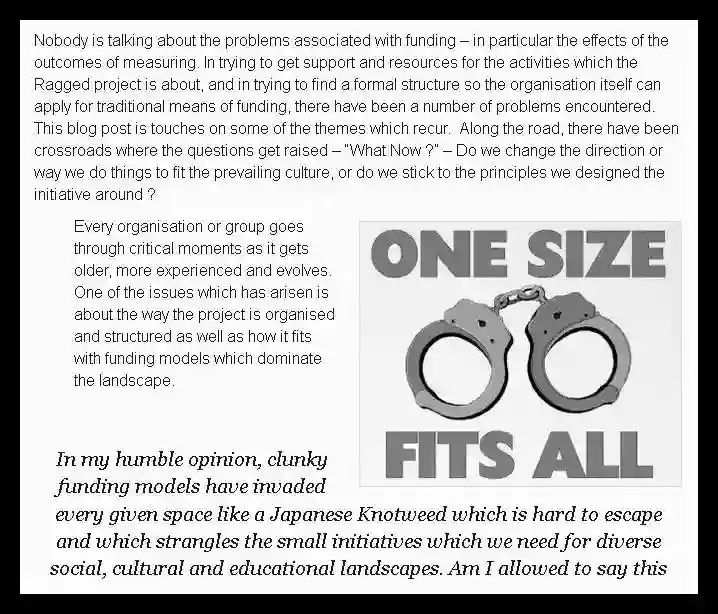
Not only did the people who were coordinating events become unhappy about the impositions but it was noticeable the effect which outcomes and measurements culture had on who felt comfortable in the spaces and participated.
Through discussion and listening to the people involved I had a long hard think about the shared values I started with, examining where the adoption of different practices led to in performative terms. I also reflected on what it is that I was doing and my motivations (Dunedin 2016).
DUNEDIN, A. (2016) Why Not To Chase Wealth And Status: A Community Perspective. Ragged University. Available At: Https://Raggeduniversity.Co.Uk/2016/08/18/Why-Not-Chase-Wealth-And-Status/. (Accessed: 2 Dec 2024)
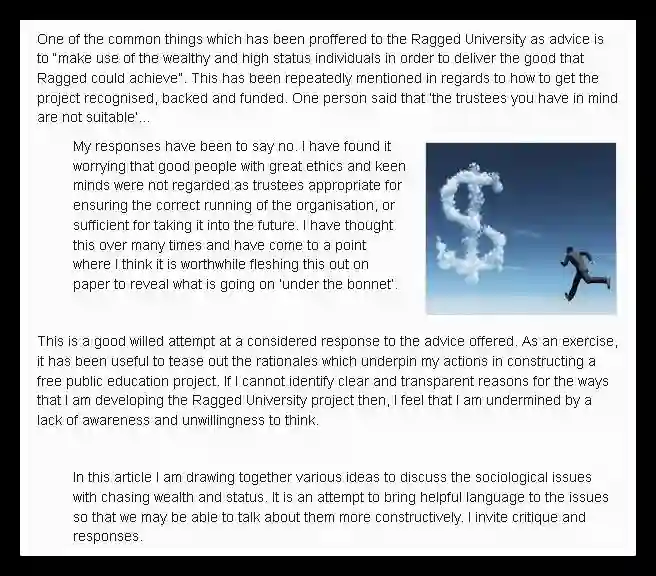
I suggest that the ‘received wisdom’ had a disastrous effect on Ragged activities and fits what Freek Vermeulen describes as a “corporate virus”, a practice which: Is associated with success (e.g. short term benefits); the harm of which occurs in the long term (causal ambiguity); and which ‘spreads quicker than it kills’ (Vermeulen 2018).
VERMEULEN, F. (2018) A Basic Theory Of Inheritance: How Bad Practice Prevails. Strategic Management Journal, 39, 1603–1629. Doi: 10.1002/Smj.2713.
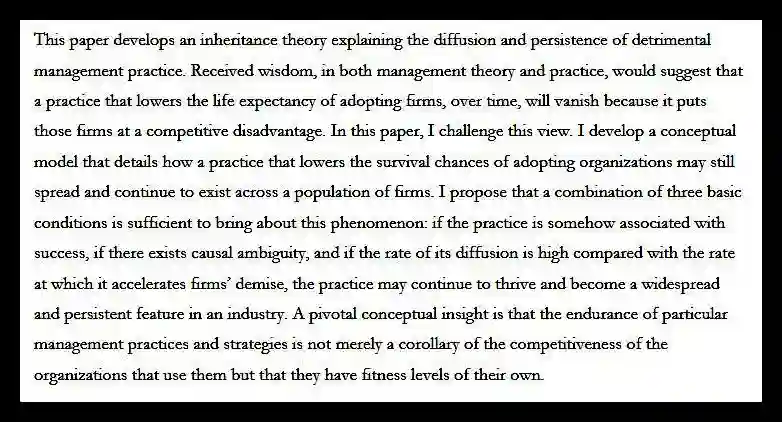
Corporate viruses and bad management practices | Freek Vermeulen
Vermeulen’s work articulates how received wisdom can be bad practice and how people/communities/enterprises become habituated to processes which take them away from their original intents and purposes. Over-repetition can generate myopias of habituation blunting apprehension to new perspectives.
In Practice Research Schön identifies how overlearning can come about through what he calls sedimentation of know-how rendering practice routine and repetitive. Reflection offers a mode of being to learn and critique tacit understandings embodied in specialized practices giving the opportunity to make ‘new sense’ of operationalized habits that impede awareness of what is not being apprehended (Schön 1983,p.61). In this way he advocates the importance of stepping outside ones practice in order to gain new perspective.
Schön discusses the practitioner-researcher as positioning themselves to reflect on the tacit norms operating in a given situation so appropriate criteria for judgment can be arrived at. This kind of awareness is essential in assessing the ethics of a course of action, on the way a problem is being framed or on the role the individual has constructed for themselves within a larger institutional context (Schön 1983,p.62).
It was through this kind of reflection on my practice of Ragged University, its aims and values, that after getting formal charitable status, I moved to close the project as a formal charity (Dunedin, 2019) because the way the Third Sector is organised and resourced is de facto an extension of the financial sector.
DUNEDIN, A. (2019) Winding Up Ragged University Scio As A Charity: Miles To Go. Ragged University. Available At: Https://Raggeduniversity.Co.Uk/2019/12/22/Ragged-University-Scio-Charity/. (Accessed: 5 Dec 2024)

Ultimately I realised the industrial-charitable complex (Bakan 2020) as anathema to the project of education as relating to human development and saw it as inevitably instrumentalising/dehumanising and damaging the communities I was in relation with [For further discussion see Appendix A].
BAKAN, J. (2020). The New Corporation: How “Good” Corporations Are Bad For Democracy. Vintage Books, A Division Of Penguin Random House.
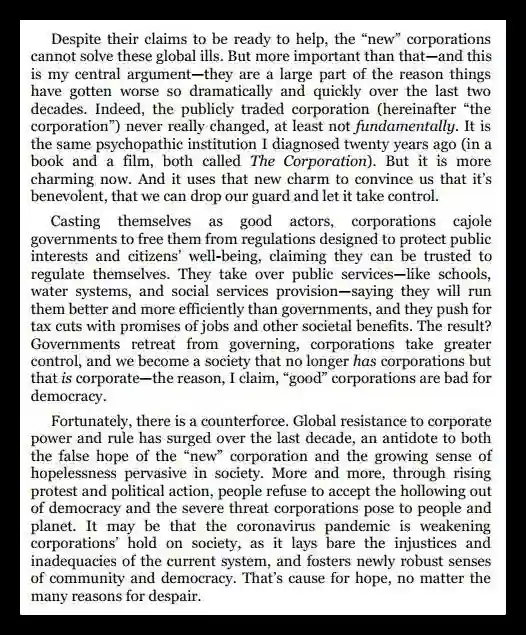
This kind of reflection is explored by Williams, Shaw, and Schrag (2021) where they discuss commissioned art works within a specific institutional ‘arts and health’ cultural setting.
WILLIAMS, F., SHAW, B., AND SCHRAG, A. (2021) Enstranglements: Performing Within And Exiting From The Arts In Health Setting. In: A Critical Appraisal Of Arts In Health Research, Frontiers Of Psychology – Health Psychology, 12. Article 732957. Doi: Https://Doi.Org/10.3389/Fpsyg.2021.732957.

Similar concerns are highlighted where the economic model “enstrangled” the work through the normative practices they were expected to adopt which ultimately instrumentalized and derivatized/dehumanized (Cahill 2011) the people involved.
Not only this but the situational forces subverted the work to obfuscate an abnegation of responsibility by government. Ultimately I see the aim of education as to ‘change your mind’, but the main question is what to change your mind into? In this essay I have shared some key moments in the practice which has ‘changed my mind’ and how I have been affected by what gets spoken about as ‘Transformative Learning’ (Calleja 2014) which pertains to building intrinsic human capabilities.
CALLEJA, C. (2014) Jack Mezirow’s Conceptualisation Of Adult Transformative Learning: A Review. Journal Of Adult And Continuing Education, 20, 117-136. Doi: 10.7227/Jace.20.1.8.
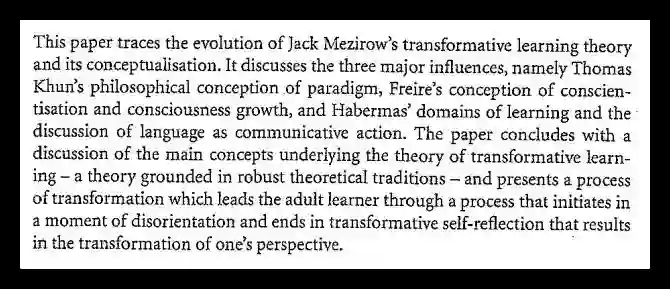
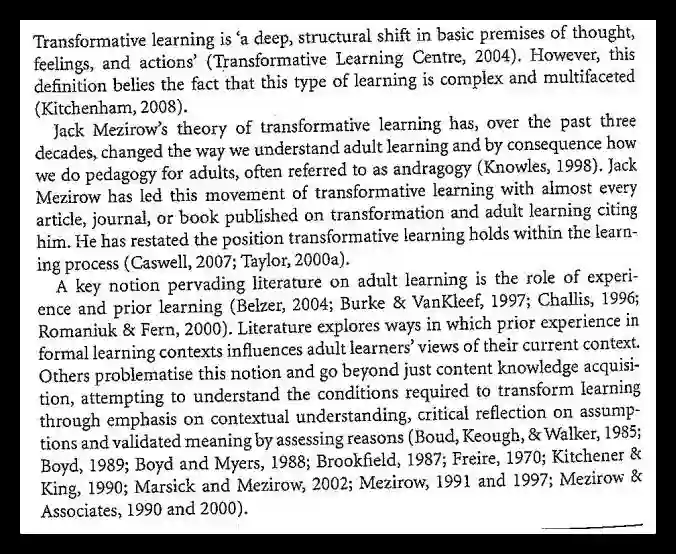
As the human sociological habitat is increasingly eroded by the frenzied enclosures of finance I found myself at a juncture where I was to pick between academic capitalism (Bishop 2012,p.268) as an artificial hell or retain the integrity of a practice which offers me the riches of human development. What I learned from my journey was the education I had discovered does not have a price.
BISHOP, C. (2012) Artificial Hells: Participatory Art And The Politics Of Spectatorship. London: Verso.
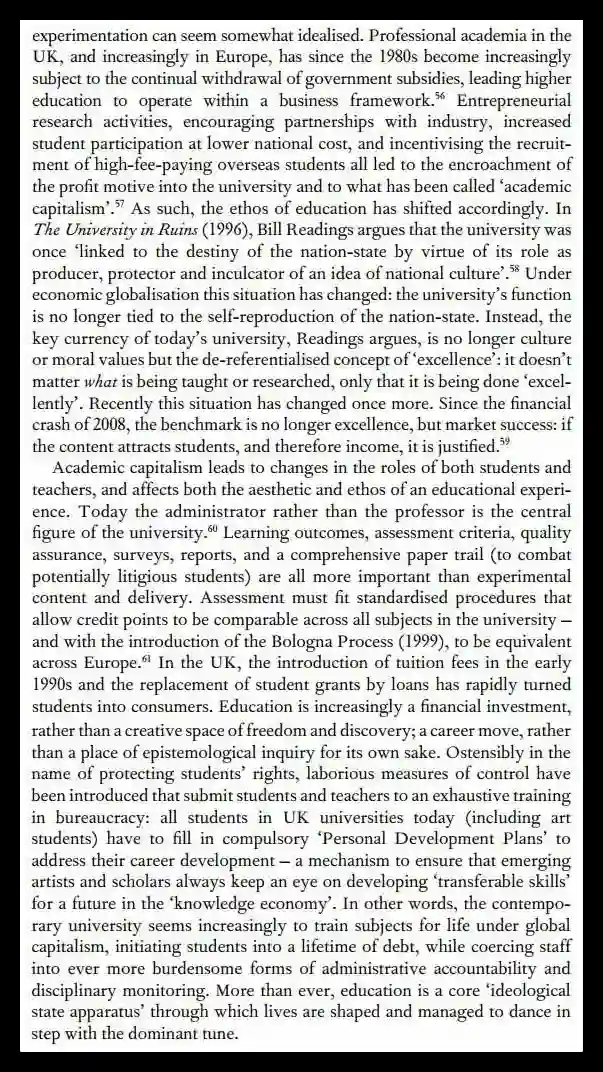
Appendix A: Out of the Heart of Darkness
Many of the common practices which are associated with measuring outcomes are inappropriate for community settings which are not professionalised, and through this approach are depersonalised (Dunedin 2017). Ultimately they become a framework for what Ann Cahill describes in her dehumanization research as ‘derivatization’ (Cahill, 2011).
DUNEDIN, A. (2017) Issues Of Seeking Patronage: A Thought Experiment. Ragged University. Available At: Https://Raggeduniversity.Co.Uk/2017/01/03/Issues-Of-Seeking-Patronage/. (Accessed: 5 Dec 2024)
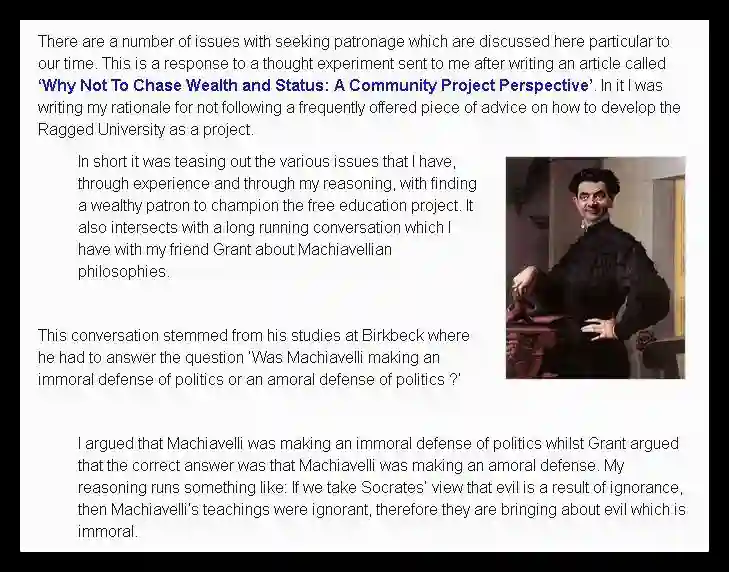
CAHILL, A. J. (2011) Overcoming Objectification: A Carnal Ethics. Routledge. Page 24
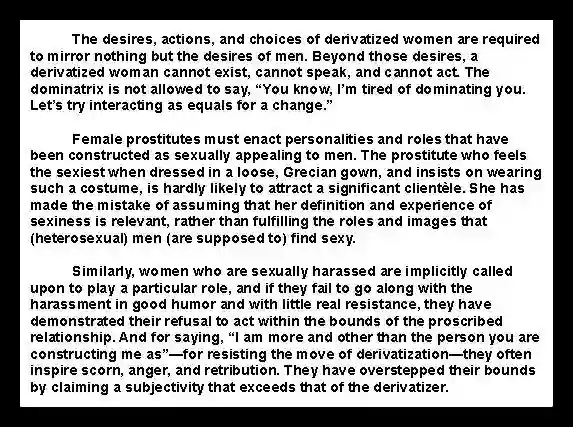
The funders and the administrative structures commonly fail to recognize and resource civic and community activities which do not speak to the codified language and the arcane administrative systems which must be navigated. It is not that there are ‘hard to reach communities’ but more hard to reach institutions, organisations and services.
Cahill’s work neatly describes the behaviour of funder policy complexes where as long as one is speaking to the set agenda then people/communities experience humanized behaviours. It is when one does not speak to the agenda of those in a privileged position that dehumanized perceptions are revealed.
One is shown to be merely a derivative of the other’s agenda. So long as you want access to resources you will have to transform your values, your work and your relationships with others in order to gain cultural opportunity. Puts in systems theory Luhmann suggests “system as difference from its environment” (Luhmann & Bednarz 2005); when you talk the particular talk you are allowed to walk a specified walk. Ultimately, they who pay the piper get to pick the tune.
LUHMANN, N. AND BEDNARZ, J. (2005) Social Systems. Stanford, Calif: Stanford University Press. Page 170.
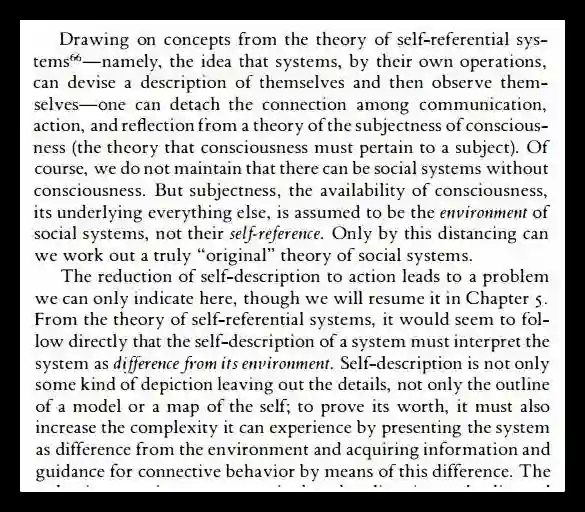
Under these situational forces (Zimbardo 2009), the research and practice of education becomes subverted to the industrial economic policy which by slow increment colonizes people and work whilst remotely determining who is included in opportunity and what is resourced via command and control line management.
This kind of transformation is a dynamic of our present culture of values where the learner/teacher/artist/artisan slowly becomes altered to the values of the market until they become a manager of learner/teachers/artist/artisan using bureaucracies as instruments in order to further transform other learner/teachers/artist/artisan to the values of the market.
This type of dynamic is described in the work of Laurence J. Peter in management studies where individuals in a hierarchy tend to “rise to their level of incompetence”, based on their skills in previous jobs (Peter & Hull, 2011).
PETER, L. J. AND HULL, R. (2011) The Peter Principle: Why Things Always Go Wrong. Harper Business. Page 20 and 25
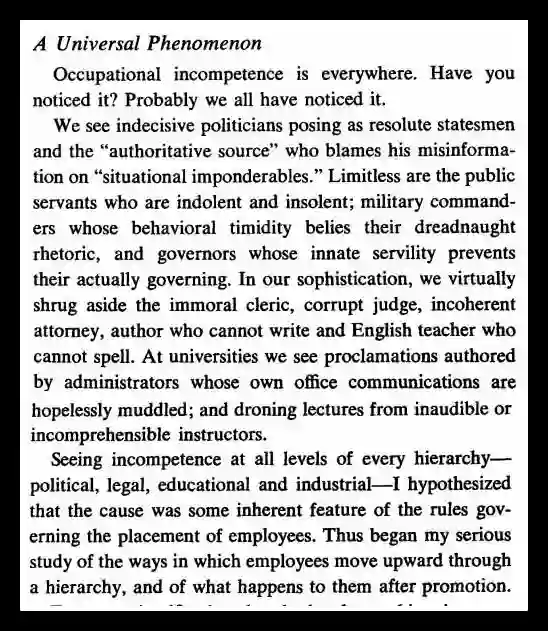
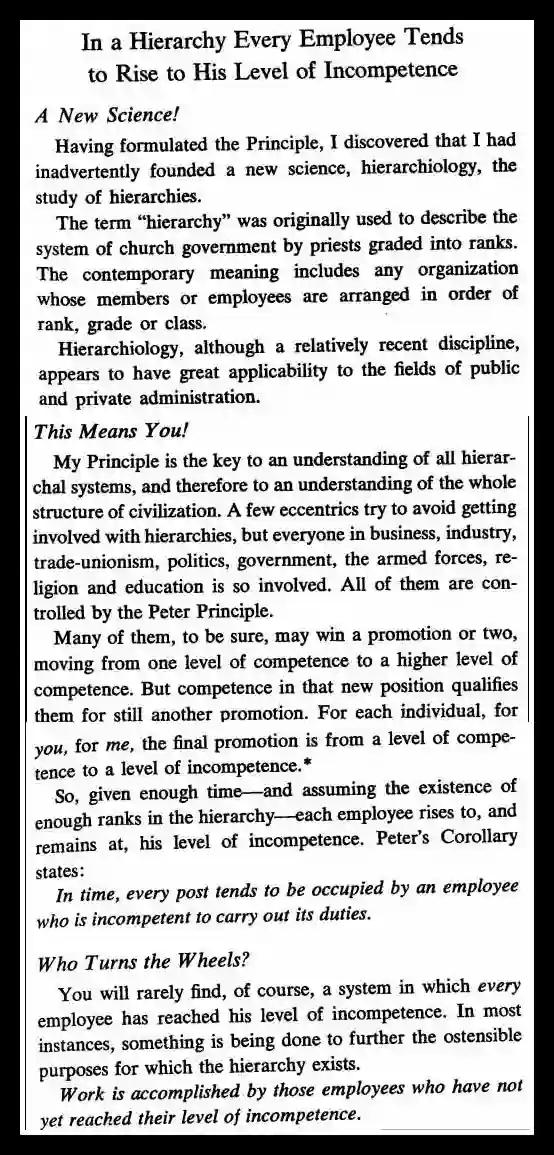
Institutional Ethnography offers a useful methodology for analysing the administrative restructuring of social/civic realities to the values of the market. Marie Campbell uses Institutional Ethnography in order to chart and reveal ruling practices, actual relations and realities among people in given situations.
In her book she uses a ‘Service Quality Initiative’ management strategy in a care context to explore the transformation of values through the impositions of textually-mediated management saying:
“Contrary to the democratic sounding explanations of the strategy, it attempted to enforce a different and more rule-bound kind of practice, as it also revised the hospital’s ideology of care that previously had been organised around being ‘home-like’” (Campbell 1998).
Campbell, M. L. (1998). Institutional Ethnography and Experience as Data. Qualitative Sociology, 21(1), 55–73. https://doi.org/10.1023/a:1022171325924
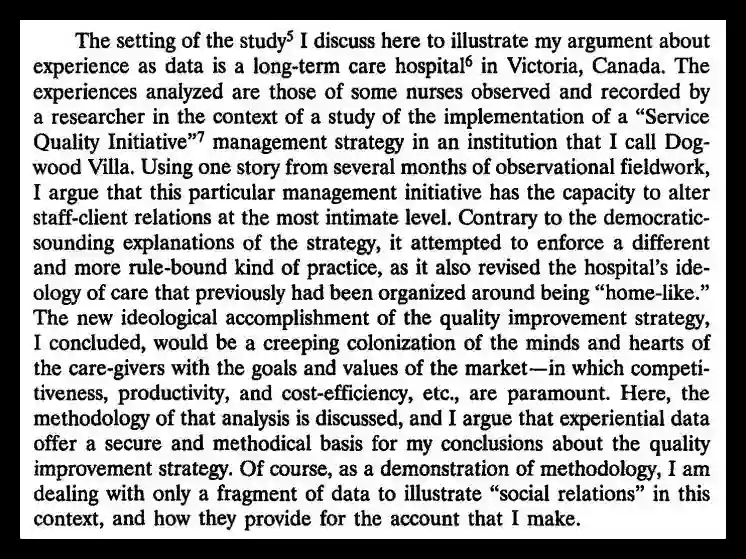
Campbell came to the opinion that the new ideological ‘Quality Improvement Strategy’ would ultimately cause the colonization of the hearts and minds of those providing care services with the aims and values of the market ultimately privileging what management structures notionalised as competitiveness, productivity, and cost-efficiency. These observations relate to Austin’s (2020) analyses of performativity making clear the relationship between what is said and what is done, helping to clarify truth-value in a context.
Similarly Timothy Diamond (1992) reported: “The very rationality they confront is itself mired in contradiction, forcing disjunctions between everyday life and administrative reality. Because the managerial drive is toward corporate balance sheets and government regulatory procedures, it distorts the central rituals of everyday life. Medical and corporate rationality negate residents’ emotional expressions, like anger and grief, and redefine them as part of diagnostic categories, in effect denying their existence”.
DIAMOND, T. (1992) Making Gray Gold: Narratives Of Nursing Home Care. Chicago: University Of Chicago Press. Page 233.
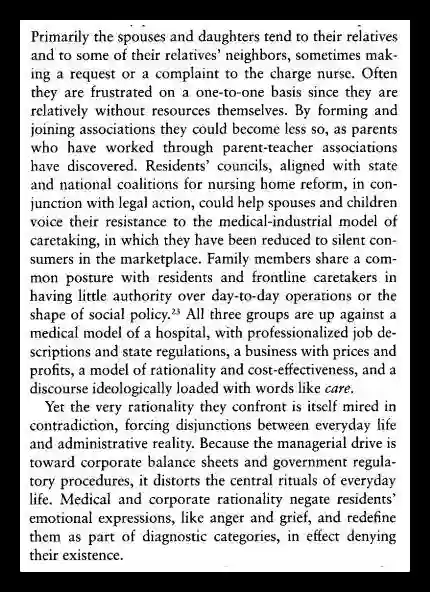
These accounts offer good articulations of the kind of colonization of values, activities and everyday life which was experienced in the Ragged University context through the pursuit of administrative enfranchisement of charitable status and application of funding bureaucracies.
Ultimately these researchers offer insight to a kind of plutocratic managerialism which has spread through the administrative practices of Neoliberalism infecting every area of life. Public goods and the lifeworlds of people are being transformed through the deliberate impoverishment of the economy (Alston 2020) in order to accentuate hierarchies of class which translate to access to opportunity.
ALSTON, P. (2020) Do Human Rights Investigations Matter? The Case Of The Un Special Rapporteur On Extreme Poverty. 8 November. Available At: Https://Www.Youtube.Com/Watch?V=Lgxry7pyitu (Accessed: 31 Dec 2024).
Do Human Rights Investigations Matter?
“And so the actual choice of countries, in some ways I was lucky because obviously China, the United States, United Kingdom, well the US and the UK came from my belief that we should not only do what Nikki Haley would like us to do which is to go to the poorest countries in the poorest continents and hammer away at them but to emphasize the theme that I’ve always pushed which is that poverty is a political choice.
Poverty could be eliminated in virtually every country if the political elite actually wanted to do that, but they don’t, they consciously don’t. They want the money for themselves. And so looking at the US and the UK where you’ve got very wealthy economies, they have lots of choices but they still opt to have 15% or whatever of their population living in poverty so I thought it was very important to convey that message and document the linkage.”
Quote from Philip Alston 23 min 28 seconds into the video ‘Do Human Rights Investigations Matter? With Prof Philip Alston, UN Special Rapporteur on Extreme Poverty; the worlds most cited Human Rights scholar.
This has resulted in the sociological habitat of society being replaced by a hostile environment (Skaife & Martyn 2022; United Nations 2021) for those who lack finance/opportunity causing mental and physical illness both in professionals and in ‘client groups’ (Ferguson et al 2020; Bhushan et al, 2020, p.12).
SKAIFE, S. AND MARTYN, J. (2022) Art Psychotherapy Groups In The Hostile Environment Of Neoliberalism: Collusion Or Resistance? Routledge. Doi: 10.4324/9781003107408. Page iii
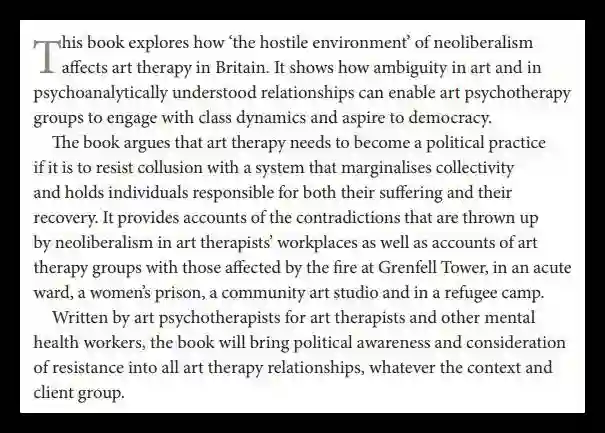
Click here to download introduction and chapter one
UNITED NATIONS (2021). Prof Philip Alston – UN Special Rapporteur On Extreme Poverty And Human Rights Report On UK. [online] YouTube. Available at: https://www.youtube.com/watch?v=LIHn7x7oT10 [Accessed 1 Jan. 2025]
Prof Philip Alston – UN Special Rapporteur on Extreme Poverty and Human Rights: Report on UK
FERGUSON, H., DISNEY, T., WARWICK, L., LEIGH, J., CONER, T. S., AND BEDDOE, L. (2020) Hostile Relationships In Social Work Practice: Anxiety, Hate And Conflict In Long-Term Work With Involuntary Service Users. Journal Of Social Work Practice, 35(1). Doi: 10.1080/02650533.2020.1834371.
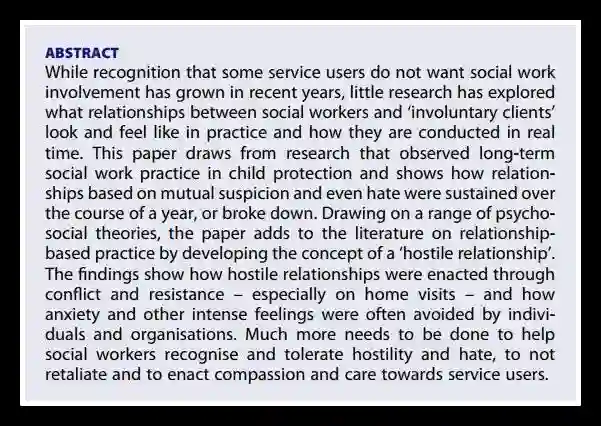
BHUSHAN, D., KOTZ, K., MCCALL, J., WIRTZ, S., GILGOFF, R., DUBE, S. R., POWERS, C., OLSON-MORGAN, J., GALESTE, M., PATTERSON, K., HARRIS, L., MILLS, A., BETHELL, C., AND BURKE HARRIS, N. (2020) Office Of The California Surgeon General. Roadmap For Resilience: The California Surgeon General’s Report On Adverse Childhood Experiences, Toxic Stress, And Health. Office Of The California Surgeon General. Doi: 10.48019/Peam8812. Available At: Https://Osg.Ca.Gov/2021/09/27/Roadmap-For-Resilience-California-Surgeon-Generals-Report/.

Bibliography of References
ALSTON, P. (2020) Do Human Rights Investigations Matter? The Case Of The Un Special Rapporteur On Extreme Poverty. 8 November. Available At: Https://Www.Youtube.Com/Watch?V=Lgxry7pyitu (Accessed: 31 Dec 2024).
AMREIN-BEARDSLEY, A. (2014) Rethinking Value-Added Models In Education: Critical Perspectives On Tests And Assessment-Based Accountability. New York: Routledge.
AUSTIN, J. L. (2020) How To Do Things With Words. Barakaldo Books.
BAKAN, J. (2020). The New Corporation: How “Good” Corporations Are Bad For Democracy. Vintage Books, A Division Of Penguin Random House.
BISHOP, C. (2012) Artificial Hells: Participatory Art And The Politics Of Spectatorship. London: Verso.
BHUSHAN, D., KOTZ, K., MCCALL, J., WIRTZ, S., GILGOFF, R., DUBE, S. R., POWERS, C., OLSON-MORGAN, J., GALESTE, M., PATTERSON, K., HARRIS, L., MILLS, A., BETHELL, C., AND BURKE HARRIS, N. (2020) Office Of The California Surgeon General. Roadmap For Resilience: The California Surgeon General’s Report On Adverse Childhood Experiences, Toxic Stress, And Health. Office Of The California Surgeon General. Doi: 10.48019/Peam8812. Available At: Https://Osg.Ca.Gov/2021/09/27/Roadmap-For-Resilience-California-Surgeon-Generals-Report/.
BIRT, C., CEBULA, C., EVANS, J., HAY, D., AND MCKENZIE, A. (2024) Poverty In Scotland 2024. This Year Our Report Asks How Effective Social Security Is At Reducing Poverty And Advancing Equality In Scotland.
BROWN, S. (2014) Personal Communication, 19 June 2014.
CAHILL, A. J. (2011) Overcoming Objectification: A Carnal Ethics. Routledge.
CAMPBELL, M. AND MANICOM, A. (EDS) (1995) Knowledge, Experience And Ruling Relations. Toronto: University Of Toronto Press. Isbn-13: 978-0802007209.
CALLEJA, C. (2014) Jack Mezirow’s Conceptualisation Of Adult Transformative Learning: A Review. Journal Of Adult And Continuing Education, 20, 117-136. Doi: 10.7227/Jace.20.1.8.
CHRIS, B., CEBULA, C., EVANS, J., HAY, D., AND MCKENZIE, A. (2024) Poverty In Scotland 2024. This Year Our Report Asks How Effective Social Security Is At Reducing Poverty And Advancing Equality In Scotland.
CLIFFORD, E. (2020) The War On Disabled People: Capitalism, Welfare And The Making Of A Human Catastrophe. Bloomsbury Academic.
COSTLEY, C. AND FULTON, J. (2019) Methodologies For Practice Research Approaches For Professional Doctorates. Sage.
DANIEL, D., RIGBY, J., WHEELER, B., BALLAS, D., THOMAS, B., FAHMY, E., GORDON, D., AND LUPTON, R. (2007) Poverty, Wealth And Place In Britain, 1968 To 2005. The Policy Press, University Of Sheffield. Available At: Https://Www.Jrf.Org.Uk/Sites/Default/Files/Migrated/Migrated/Files/2019-Poverty-Wealth-Place.Pdf.
DEATHS BY WELFARE PROJECT (N.D.) Available At: Https://Deathsbywelfare.Org/.
DIAMOND, T. (1992) Making Grey Gold: Narratives Of Nursing Home Care. Chicago: University Of Chicago Press. Page 233.
DISNEY, T., FERGUSON, H., WARWICK, L., LEIGH, J., CONER, T. S., AND BEDDOE, L. (2020) Hostile Relationships In Social Work Practice: Anxiety, Hate And Conflict In Long-Term Work With Involuntary Service Users. Journal Of Social Work Practice, 35(1). Doi: Https://Doi.Org/10.1080/02650533.2020.1834371.
Dorling, D. (2007) Social harm and social policy in Britain Chapter 10 in, R. Roberts and W. McMahon (eds) Social Justice and Criminal Justice, London: Centre for Crime and Justice Studies. (pp. 122-135)
DRANSFIELD, S. (2014) A Tale Of Two Britains: Inequality In The Uk. Oxfam Gb. Available At: Https://Policy-Practice.Oxfam.Org/Resources/A-Tale-Of-Two-Britains-Inequality-In-The-Uk-314152/.
DUNEDIN, A. (2014) Facilitating Rather Than Prescribing: Outcomes Of Measuring. Ragged University. Available At: Https://Raggeduniversity.Co.Uk/2014/06/10/Outcomes-Of-Measuring/. (Accessed: 28 Nov 2024)
DUNEDIN, A. (2016) Why Not To Chase Wealth And Status: A Community Perspective. Ragged University. Available At: Https://Raggeduniversity.Co.Uk/2016/08/18/Why-Not-Chase-Wealth-And-Status/. (Accessed: 2 Dec 2024)
DUNEDIN, A. (2017) Issues Of Seeking Patronage: A Thought Experiment. Ragged University. Available At: Https://Raggeduniversity.Co.Uk/2017/01/03/Issues-Of-Seeking-Patronage/. (Accessed: 5 Dec 2024)
DUNEDIN, A. (2019) Winding Up Ragged University Scio As A Charity: Miles To Go. Ragged University. Available At: Https://Raggeduniversity.Co.Uk/2019/12/22/Ragged-University-Scio-Charity/. (Accessed: 5 Dec 2024)
DUNEDIN, A. (2022) History – Ragged University. Ragged University. Available At: Https://Raggeduniversity.Co.Uk/About/History/. (Accessed: 16 Dec 2024)
DUNEDIN, A. (2024) Widening Participation In The Neoliberal University – Ragged University. Ragged University. Available At: Https://Raggeduniversity.Co.Uk/2024/09/04/Widening-Participation-In-The-Neoliberal-University/. (Accessed: 18 Dec 2024)
FERGUSON, H., DISNEY, T., WARWICK, L., LEIGH, J., CONER, T. S., AND BEDDOE, L. (2020) Hostile Relationships In Social Work Practice: Anxiety, Hate And Conflict In Long-Term Work With Involuntary Service Users. Journal Of Social Work Practice, 35(1). Doi: 10.1080/02650533.2020.1834371.
FISHER, M. (2022) Capitalist Realism: Is There No Alternative? (Second Edition). Zer0 Books. Page 6.
HASMAN, B. C. (2006) ‘A Manifesto For Performative Research’, Media International Australia Incorporating Culture And Policy: Quarterly Journal Of Media Research And Resources, 118, 98–106.
JRF (2024) Uk Poverty 2024: The Essential Guide To Understanding Poverty In The Uk. Joseph Rowntree Foundation. Available At: Https://Unionsafety.Eu/Elibrary/Media/Elibrarymedia/Ukpoverty2024josephrowntreefoundation.Pdf.
KUTZ, A. (2023) Double Bind-Communication As A Cause Of Burnout: A Proposal For A Theory On The Effects Of Toxic Communication In Organisations. Springer. Doi: 10.1007/978-3-658-40780-3.
LEVINE, S. K. (2009) Trauma, Tragedy, Therapy: The Arts And Human Suffering. Jessica Kingsley Publishers.
LOCKE, R. R. AND SPENDER, J.-C. (2011) Confronting Managerialism: How The Business Elite And Their Schools Threw Our Lives Out Of Balance. Zed Books.
LUHMANN, N. AND BEDNARZ, J. (2005) Social Systems. Stanford, Calif: Stanford University Press. Page 170.
MALTHUS, T. R. AND MAYHEW, R. J. (2015) An Essay On The Principle Of Population And Other Writings. Penguin Books.
MOORE, M. H. (1995) Creating Public Value: Strategic Management In Government. Harvard University Press.
MONTAGUE, C. J. (1904) Sixty Years In Waifdom; Or, The Ragged School Movement In English History. Patterson Smith.
Nelson, R. (2013). Practice as research in the arts: principles, protocols, pedagogies, resistances. Palgrave Macmillan.
OLDENBURG, R. (1997) The Great Good Place: Cafes, Coffee Shops, Community Centers, Beauty Parlors, General Stores, Bars, Hangouts, And How They Get You Through The Day. New York: Marlowe.
O’BRIEN, R. (2001) “An Overview Of The Methodological Approach Of Action Research.” In: RICHARDSON, R. (ED.) Theory And Practice Of Action Research. Joao Pessoa, Brazil: Universidade Federal Da Paraiba. (English Version) Available At: Http://Www.Web.Ca/~Robrien/Papers/Arfinal.Html
Persaud ROXANNE, (2011) Twenty-First Century Perspectives On Failure In EDS, HILLSON, D. ‘Failure Files: Perspectives On Failure. Triarchy Press. P. 139.
PETER, L. J. AND HULL, R. (2011) The Peter Principle: Why Things Always Go Wrong. Harper Business.
PIOTROWSKA, A. (2020) ‘Complexities, Compromises And Complicities’ In Creative Practice Research In The Age Of Neoliberal Hopelessness. Edinburgh University Press. Doi: 10.1515/9781474463584.
PRING, J. (2024) The Department: How A Violent Government Bureaucracy Killed Hundreds And Hid The Evidence. Pluto Press.
RASHDALL, H. (1895) ‘The Universities Of Europe In The Middle Ages: Salerno, Bologna, Paris’. Clarendon Press, P. 148–161.
ROBERTSON, R. (2023) What Research Has Led To Policy Or Practice Change That Improved The Care? By Prof Roy Robertson. Youtube. Available At: Https://Youtu.Be/Lhv_5qtqf90. (Accessed: 23 Dec 2024)
SCHÖN, D. (1983) The Reflective Practitioner. New York: Basic Books/Perseus.
SHAXSON, N. (2018) The Finance Curse: How Global Finance Is Making Us All Poorer. The Bodley Head. P. 66.
SMITH, H. AND DEAN, R. (EDS) (2009) Practice-Led Research, Research-Led Practice In The Creative Arts (Research Methods For The Arts And Humanities). Edinburgh University Press. P. 45.
SKAIFE, S. AND MARTYN, J. (2022) Art Psychotherapy Groups In The Hostile Environment Of Neoliberalism: Collusion Or Resistance? Routledge. Doi: 10.4324/9781003107408.
SWANTZ, M. L. (2011) Participatory Action Research As Practice In REASON, P. AND BRADBURY, H. (EDS) The Sage Handbook Of Action Research: Participative Inquiry And Practice (2nd Ed). Sage. P. 31.
TAGORE, R. (1967) Towards Universal Man. Asia Pub. House.
TIMOTHY, D. (1992) Making Grey Gold: Narratives Of Nursing Home Care. Chicago: University Of Chicago Press. Page 233.
TST (2019) Elitist Britain. The Sutton Trust. Available At: Https://Www.Suttontrust.Com/Our-Research/Elitist-Britain-2019/.
UNITED NATIONS (2021). Prof Philip Alston – UN Special Rapporteur On Extreme Poverty And Human Rights Report On UK. [online] YouTube. Available at: https://www.youtube.com/watch?v=LIHn7x7oT10 [Accessed 1 Jan. 2025]
VERMEULEN, F. (2016) Corporate Viruses And Bad Management Practices | Tedxlondonbusinessschool. Available At: Https://Youtu.Be/Opfpha9wvxw (Accessed: 29 December 2024).
VERMEULEN, F. (2018) A Basic Theory Of Inheritance: How Bad Practice Prevails. Strategic Management Journal, 39, 1603–1629. Doi: 10.1002/Smj.2713.
WILLIAMS, F., SHAW, B., AND SCHRAG, A. (2021) Enstranglements: Performing Within And Exiting From The Arts In Health Setting. In: A Critical Appraisal Of Arts In Health Research, Frontiers Of Psychology – Health Psychology, 12. Article 732957. Doi: Https://Doi.Org/10.3389/Fpsyg.2021.732957.
ZIMBARDO, P. G. (2009) ‘The Lucifer Effect: How Good People Turn Evil’.

